Degree in Psychology
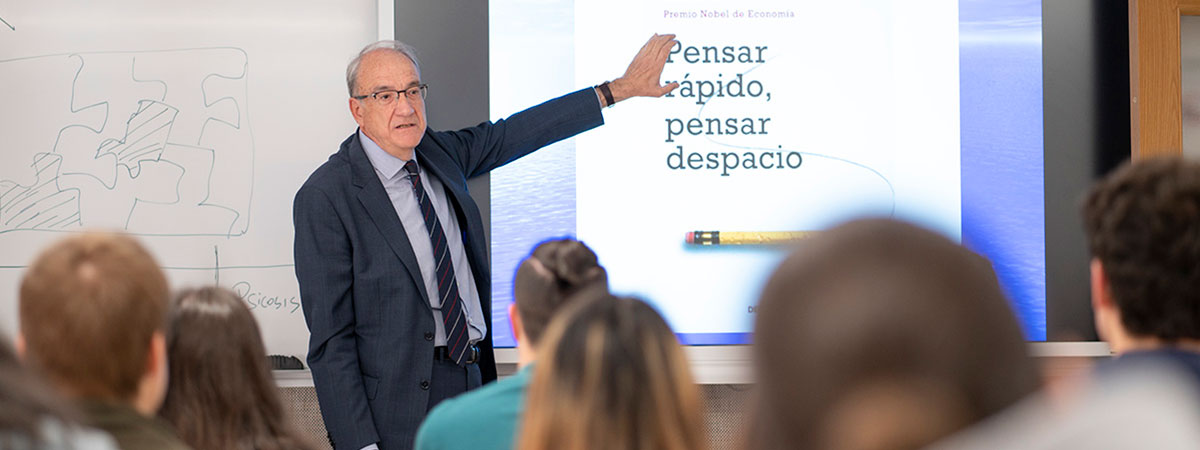
Specialized program aimed at professional practice
The Bachelor's Degree in Psychology has 18 ECTS credits of professional internships, placing the Nebrija University at the head of the educational institutions with the greatest offer of practical training. This is a commitment to the employability of its students from the very first year, thanks to practical and real training from general health psychologists, and the carrying out of extra-academic activities such as talks, weeklies or meetings with professionals in the sector
All students leave with the Specialization in Health Psychology, with training related to mental health and psychological intervention, which is basic content to access the Master's Degree in General Health Psychology, but they can also take four specializations:
The theoretical, practical and ethical aspects related to the evaluation, diagnosis and treatment of mental health disorders and problems are studied. It delves into issues related to psychologists' specific action areas, such as sports psychology and psycho-oncology.
Psychological processes related to learning, teaching and education in general are addressed here. It focuses on understanding how individuals acquire knowledge, develop skills, and relate to the educational environment. Among the tasks of the educational psychologist, we can find analyzing the development of cognitive and emotional processes, the evaluation and diagnosis of difficulties, developmental disorders, as well as aptitudes, academic performance and socio-emotional skills. Additionally, an educational psychologist participates in the school by designing educational programs and providing educational guidance and counseling.
It focuses on providing students with a deep understanding of the psychological processes that occur in social contexts, that is, it studies the way in which individuals think, feel and behave in these types of contexts. Contents related to social influence processes, attitudes, identity and group processes, prejudices and discrimination are addressed from the main theories, such as attribution theory, social learning and social identity, among others.
It focuses on the application of psychological principles and knowledge to the work environment, human resources management and the analysis of organizational dynamics. Some of the topics addressed in this specialization are organizational psychology, personnel selection and evaluation, talent management, professional development, motivation, satisfaction and work well-being.
The curriculum, in addition to developing the four academic specializations that cover most of the work fields in psychology, guarantees that the student takes the 90 ECTS credits necessary in the first three years to be able to complete the Master's Degree in General Health Psychology, which in Spain regulates the health profession in psychology. This is important because it allows the student to take one of the four specializations offered, and have a second specialization.
The specializations are a great opportunity for students because it allows them to explore other areas of action of the psychology professional in society. Delving into different areas of knowledge makes their academic and professional CV stand out from others.
The Bachelor's Degree in Psychology offers specialized training thanks to the teaching staff made up of health professionals who are immersed in clinical practice, research and the latest scientific advances, which allows them to transfer all that knowledge to the classroom. We prepare future health professionals with theory, competences, internships and meetings with professionals, which will allow them to quickly enter the labor market.
Student profile: Those interested in studying and earning a Degree in Psychology from Nebrija University should be interested in issues related to well-being and quality of life, ethical and social commitment and have a scientific inclination, as well as an inclination towards cultural knowledge in general, an adequate capacity for oral and written expression, as well as a concern to know and investigate various subjects and acquire competences related to their comprehension, interpretation and professional projection, such as: ability to work in a team, readiness for management, communicative and interpersonal skills, critical sense, autonomy, curiosity, public speaking skills, stress tolerance, initiative, creativity, among other skills.
Graduate profile The graduate in this Psychology degree can work in his own practice, or in any institution or company that require psychologists among its collaborators.
Official Degree:Bachelor's Degree in Psychology
Center responsible:School of Life and Nature Sciences
Branch of knowledge: Health Sciences
Openings available: 135 classromm attendance
Total Credits:240 credits.
Minimum of 12 ECTS credits and maximum of 90 ECTS credits per enrollment and academic period.
Academic year in which it was implemented: 2017 – 2018
Languages: Spanish.
Type of Education: Classroom attendance
Academic Regulations: General student’s regulations. Credit transfer and recognition. Regulation of student participation. Common procedures for carrying out the Final Research Project
University Services: [+info]
Internal Quality Assurance System System managers Incidents, Suggestions and Complaints Job placement report and assessment of training received
Program that develops four academic concentrations that cover most of the work fields in Psychology
Curriculum
All of our degrees and curriculum have been prepared in accordance with the new guidelines set by current legislation, having already been verified by the National Agency for Quality Assessment.
he student must take 240 credits
First year 60 ECTS
First Semester 30 ECTS- 6 ECTS | Introduction to Statistics in Psychology
- 6 ECTS | Biological Basis of Behavior
- 6 ECTS | Learning
- 6 ECTS | Social psychology
- 6 ECTS | History of Psychology
Second Semester 30 ECTS- 6 ECTS | Personality and Individual Differences
- 6 ECTS | Developmental Psychology I
- 6 ECTS | Psychometry
- 6 ECTS | Attention, Perception and Memory
- 6 ECTS | Motivation and Emotion
Second year 60 ECTS
First Semester 30 ECTS- 6 ECTS | Data Analysis in Psychology
- 6 ECTS | Psychology of Groups
- 6 ECTS | Developmental Psychology II
- 6 ECTS | Neuropsychology
- 6 ECTS | Psychology of the Company and the Organizations
Second Semester 30 ECTS- 6 ECTS | Psychopathology I
- 6 ECTS | Psychological Evaluation and Diagnosis I
- 6 ECTS | Research Designs in Psychology
- 6 ECTS | Physiological Psychology
- 6 ECTS | Ethology
Third year 60 ECTS
First Semester 30 ECTS- 6 ECTS | Psychopathology II
- 6 ECTS | Psychological Evaluation and Diagnosis II
- 6 ECTS | Psychology of Language
- 6 ECTS | Intervention and Psychological Treatments I
- 6 ECTS | Techniques and Therapeutic Abilities
Second Semester 30 ECTS- 6 ECTS | Health Psychology
- 6 ECTS | Psychogerontology
- 6 ECTS | Educational psychology
- 6 ECTS | Intervention and Psychological Treatments II
- 6 ECTS | Legal and Forensic Psychology
Fourth year 60 ECTS
First Semester 24 ECTS- 5 ECTS | Sexual and Couple Therapy
- 2 ECTS | Ethics and Professional Deontology
- 2 ECTS | English for Psychologists
- 5 ECTS | Elective/Mention
- 5 ECTS | Elective/Mention
- 5 ECTS | Elective/Mention
Second Semester 36 ECTS- 5 ECTS | Elective/Mention
- 5 ECTS | Elective/Mention
- 18 ECTS | Internship
- 8 ECTS | End of Degree Project
More information on these subjects
Clinical Intervention Specialization
- 5 ECTS | Psychopharmacology (4th year, 1st semester)
- 5 ECTS | Mental health intervention (4th year, 1st semester)
- 5 ECTS | Sports psychology (4th year, 1st semester)
- 5 ECTS | Intervention techniques in clinical psychology (4th year, 2nd semester)
- 5 ECTS | Psycho-Oncology (4th year, 2nd semester)
Social Psychology Specialization
- 5 ECTS | Criminal psychology (4th year, 1st semester)
- 5 ECTS | Psychology of crime and social exclusion (4th year, 1st semester)
- 5 ECTS | Diagnosis in Social Psychology (4th year, 1st semester)
- 5 ECTS | Psychology of community intervention (4th year, 2nd semester)
- 5 ECTS | Drug addiction psychology (4th year, 2nd semester)
Educational Psychology Specialization
- 5 ECTS | Psychopedagogical and educational orientation (4th year, 1st semester)
- 5 ECTS | Developmental and learning disorders (4th year, 1st semester)
- 5 ECTS | Early intervention and care (4th year, 1st semester)
- 5 ECTS | Assessment and intervention in disability and diversity (4th year, 2nd semester)
- 5 ECTS | School violence (4th year, 2nd semester)
Specialization in Psychology of Work, Organizations and Human Resources
- 5 ECTS | Psychology of human resources (4th year, 1st semester)
- 5 ECTS | Selection and training of personnel (4th year, 1st semester)
- 5 ECTS | Consumer and Marketing Psychology (4th year, 1st semester)
- 5 ECTS | Occupational health (4th year, 2nd semester)
- 5 ECTS | Coaching (4th year, 2nd semester)
This project involves the development of research tasks regarding different subjects by the student under the advice of one or several professors of the Department and, occasionally, professionals from the business world. For this, the student has the possibility to choose a project from among those offered.
Through the transversal subjects you will be able to complement your education and complete your CV in a practical, collaborative and fun way.
It is a voluntary program with no added cost. Upon completion, you will be provided with a diploma.
Access all the informationNebrija University, which is committed to languages and quality, provides the student with added value with the Diploma in English Professional Communication, which will allow him/her to achieve with confidence the competence demanded to successfully join the labor market.
It corresponds to level C1.
More information hereProfessors
| Profesores Professors | Porcentaje de Doctores Percentage of PhD holders |
| 48 | 70,83% |
 Sara Uceda Gutiérrez
Directora del Departamento de Psicología
Sara Uceda Gutiérrez
Directora del Departamento de PsicologíaProfesora de Bases Biológicas de la Conducta Director of the Department of Psychology
Professor Licenciada en Psicología, Máster en Fisiología y Neurociencias y Doctora por la Universidad de Sevilla con Mención Internacional. Actualmente es Decana de la Facultad de Ciencias de la Vida y de la Naturaleza y Directora del Departamento de Psicología de la Universidad Nebrija. Docente e investigadora del Área de Psicobiología, sus intereses están centrados en procesos cognitivos como el aprendizaje, la memoria, la emoción o la atención. Cuenta con amplia experiencia docente tanto en cursos de grado como de máster, ha participado y participa en varios proyectos científicos nacionales e internacionales y es autora de diversos artículos científicos publicados en revistas con un alto factor de impacto e indexadas en el Journal Citation Reports.
 Ana Isabel Beltrán Velasco
Directora del Grado en Psicología
Ana Isabel Beltrán Velasco
Directora del Grado en PsicologíaProfesora de Neuropsicología Director of the Bachelor's Degree in Psychology
Professor Graduada en Psicología. Máster Universitario en Neuropsicología (Itinerario Investigación). Doctora en Psicofisiología aplicada, sus principales líneas de investigación están centradas en el estudio de variables que impactan en los procesos cognitivos y el rendimiento de las funciones ejecutivas, así como la regulación de los ejes y circuitos neuronales implicados. Tiene amplia experiencia docente en grado y máster, y es autora de numerosos artículos científicos publicados en revistas de alto impacto en JCR. Además, es editora invitada en revistas de alto impacto como IJMS, Physiology&Behavior o Frontiers in Psychiatry.
 Patricia Vizuete Escobar
Coordinadora de Prácticas
Patricia Vizuete Escobar
Coordinadora de PrácticasProfesora de Salud Laboral
Profesora de Psicología de los Recursos Humanos
Profesora de Psicología Social Internship Coordinator
Professor Profesora de “Psicología y educación del adolescente”. Graduada en Psicología por la Universidad de Sevilla. Máster en Gestión de Recursos Humanos por Business School Cajasol. Máster en Universitario en Prevención de Riesgos Laborales (especialidades en Seguridad, Higiene e Ergonomía y Psicosociología Aplicada). Universidad Nebrija. Ha colaborado en diversas investigaciones por la Universidad de Sevilla en los Departamentos de Teoría de la Educación, Psicobiología y Psicología del Deporte. Ha realizado diversos proyectos vinculados al ámbito empresarial con Deloitte, CEU San Pablo, Senior Staff Consultores, Prosegur, etc.
 Olivia García-Velasco Rubio
Coordinadora de Trabajo de Fin de Grado
Olivia García-Velasco Rubio
Coordinadora de Trabajo de Fin de GradoProfesora de Psicología Social
Profesora de Intervención y tratamientos psicológicos II
Profesora de Psicología de la salud Coordinator of Final Degree Project
Professor Doctora en Psicología por la Universidad Complutense de Madrid, máster en Gestión de Recursos Humanos y licenciatura en Psicología por dicha universidad. Máster en Salud Mental por la Universidad a Distancia de Madrid. Publicaciones y ponencias sobre liderazgo y género, dentro del campo de la Psicología Social, y sobre gestión del estrés en adultos. Formación y experiencia en áreas de la Metodología de Investigación, la Clínica y la Psicología del trabajo. Consulta privada de Psicología, dedicada al tratamiento de psicopatología de adolescentes y adultos. En la actualidad, es profesora de las asignaturas de Psicología Social e Intervención y tratamientos I, así como tutora de 1º del Grado en Psicología. Sus líneas de investigación son la integración social y el asma como enfermedad psicosomática.
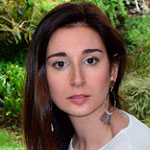 Natalia Arias del Castillo
Profesora de Psicología Fisiológica
Professor
Licenciada en Biología, graduada en Psicología, Máster en Neurociencias, Doctora en Psicología e IP del grupo de investigación de la Facultad de Ciencias de la Vida y de la Naturaleza. Su experiencia docente abarca diversos sistemas universitarios, especializada en el seguimiento y maximización de los resultados de los alumnos en entornos universitarios. A nivel de investigación, se interesa por el estudio de tratamientos no invasivos en estadios tempranos de la neurodegeneración, así como en la búsqueda de biomarcadores en dichas enfermedades. Su inquietud abarca desde los ensayos preclínicos hasta la traslación a humanos, lo cual se refleja en las numerosas colaboraciones con universidades nacionales y extranjeras y con empresas.
Natalia Arias del Castillo
Profesora de Psicología Fisiológica
Professor
Licenciada en Biología, graduada en Psicología, Máster en Neurociencias, Doctora en Psicología e IP del grupo de investigación de la Facultad de Ciencias de la Vida y de la Naturaleza. Su experiencia docente abarca diversos sistemas universitarios, especializada en el seguimiento y maximización de los resultados de los alumnos en entornos universitarios. A nivel de investigación, se interesa por el estudio de tratamientos no invasivos en estadios tempranos de la neurodegeneración, así como en la búsqueda de biomarcadores en dichas enfermedades. Su inquietud abarca desde los ensayos preclínicos hasta la traslación a humanos, lo cual se refleja en las numerosas colaboraciones con universidades nacionales y extranjeras y con empresas.
 Andrés Arriaga Arrizabalaga
Tutor TFG/Prácticas
TFG/Internship Tutor
Diploma en Psychological Studies por la Leeds University (1994), Licenciado (1996) y Doctor en Filosofía-Psicología (1999) por la Universidad de Deusto, es especialista en Clínica Psiquiátrica y Psicólogo General Sanitario con experiencia clínica de más de veinte años. Trabajó como investigador en la Unidad de Psiquiatría Clínica y Social (centro colaborador de la OMS) del hospital Universitario Marqués de Valdecilla y en otras instituciones psiquiátricas del Reino Unido (Bowden House Clinic) y México (Hospital Dorantes Mesa). Ha sido Catedrático de Psicopatología en la Universidad Europea y profesor visitante entre 2014 y 2016 en la Yale University (EEUU), Bilgi University (Turquía) o la Universidad Veracruzana (México), entre otras. Acreditado por ANECA, ha publicado manuales y artículos sobre salud mental, educación superior y conducta saludable y ha llevado sus pesquisas a varios encuentros y congresos. Desde 2010, es miembro del panel de expertos para proyectos de investigación en salud mental en la Comisión Europea y forma parte del panel de evaluadores externos para varias instituciones (UNIBASQ, UEFISCDI, SEPIE, ERASMUS+, etc.).
Andrés Arriaga Arrizabalaga
Tutor TFG/Prácticas
TFG/Internship Tutor
Diploma en Psychological Studies por la Leeds University (1994), Licenciado (1996) y Doctor en Filosofía-Psicología (1999) por la Universidad de Deusto, es especialista en Clínica Psiquiátrica y Psicólogo General Sanitario con experiencia clínica de más de veinte años. Trabajó como investigador en la Unidad de Psiquiatría Clínica y Social (centro colaborador de la OMS) del hospital Universitario Marqués de Valdecilla y en otras instituciones psiquiátricas del Reino Unido (Bowden House Clinic) y México (Hospital Dorantes Mesa). Ha sido Catedrático de Psicopatología en la Universidad Europea y profesor visitante entre 2014 y 2016 en la Yale University (EEUU), Bilgi University (Turquía) o la Universidad Veracruzana (México), entre otras. Acreditado por ANECA, ha publicado manuales y artículos sobre salud mental, educación superior y conducta saludable y ha llevado sus pesquisas a varios encuentros y congresos. Desde 2010, es miembro del panel de expertos para proyectos de investigación en salud mental en la Comisión Europea y forma parte del panel de evaluadores externos para varias instituciones (UNIBASQ, UEFISCDI, SEPIE, ERASMUS+, etc.).
 Juliana Barbosa Lins de Almeida
Profesora de Motivación y Emoción
Juliana Barbosa Lins de Almeida
Profesora de Motivación y EmociónProfesora de Psicología Social
Profesora de Aprendizaje Professor Licenciada en Psicología, Máster en Psicología con énfasis en Género, Máster en Psicodrama, Doctora en Psicología Social (acreditación ANECA). Docente desde 2008, cuenta con una amplia experiencia en asignaturas en el grado de Psicología, como Psicología Social; Prácticas en Psicología Social Comunitaria; Psicología, Derechos Humanos e Inclusión Social; Psicología y Género, Psicodrama, Teoría y Funcionamiento de Grupos. Profesora del Máster en Educación Inclusiva e Intercultural en la Universidad Internacional de la Rioja, donde participa como directora de trabajos de fin de Máster y cómo investigadora en el área de inclusión e interculturalidad. A lo largo de su carrera ha colaborado en diversos proyectos de investigación en Brasil y España. Tiene publicaciones disponibles en actas de congresos, artículos en revistas especializadas, capítulos de libro y contribuciones como ponente en Congresos y Seminarios, tanto nacionales como internacionales. Experiencia como revisora en Ethics and Racial Studies (2011-2015), Veredas (2015-2018l) y como miembro editorial en la revista Internacional Journal of Culture, Education and Society (2018-actual).
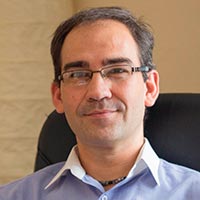 Enrique J. Berber Serrano
Profesor de Psicopatología I
Professor
Licenciado en Psicología por la Universidad de Granada y Doctor Cum Laude en Psicología por la Universidad Autónoma de Madrid. Especializado en Trastornos de la Conducta Alimentaria por el Hospital Universitario Infantil Niño Jesús de Madrid. Ejerce como psicólogo en consulta privada desde 2004. Es profesor asociado en la Universidad Complutense de Madrid y en la Universidad Alfonso X El Sabio. Además ha sido coordinador de grupos de apoyo de la asociación ADANER en Madrid, así como técnico de formación continuada en centros de Salud Pública de Castilla la Mancha y Castilla y León.
Enrique J. Berber Serrano
Profesor de Psicopatología I
Professor
Licenciado en Psicología por la Universidad de Granada y Doctor Cum Laude en Psicología por la Universidad Autónoma de Madrid. Especializado en Trastornos de la Conducta Alimentaria por el Hospital Universitario Infantil Niño Jesús de Madrid. Ejerce como psicólogo en consulta privada desde 2004. Es profesor asociado en la Universidad Complutense de Madrid y en la Universidad Alfonso X El Sabio. Además ha sido coordinador de grupos de apoyo de la asociación ADANER en Madrid, así como técnico de formación continuada en centros de Salud Pública de Castilla la Mancha y Castilla y León.
 Francisco Alfonso Burgos Julián
Profesor de Introducción a la Estadística en Psicología
Francisco Alfonso Burgos Julián
Profesor de Introducción a la Estadística en PsicologíaProfesor de Psicometría
Profesor de Análisis de Datos en Psicología Professor Licenciado en Psicología, Máster en Metodología de las Ciencias del Comportamiento y la Salud y Doctor en Psicología por la UNED. Profesor Ayudante Doctor acreditado por la ANECA, cuenta con la habilitación como Psicólogo General Sanitario, con una amplia experiencia en el sector público y privado, participa en la actualidad en proyectos científicos subvencionados y ha publicado diversos trabajos de investigación, colaborando como revisor en revistas de alto impacto.
 Jaisalmer de Frutos Lucas
Tutora TFG/Prácticas
TFG/Internship Tutor
Doctora en Psicología Clínica y de la Salud por la Universidad Autónoma de Madrid (España) y en Medical and Health Sciences por Edith Cowan University (Australia). Su interés científico se centra en el estudio del efecto protector del estilo de vida sobre la función cerebral, la cognición y el estado de ánimo a lo largo del envejecimiento. Ha generado 12 artículos científicos, 3 capítulos de libro y más de 40 comunicaciones en congresos nacionales e internacionales. Su trabajo ha sido reconocido con diferentes premios, incluyendo el de mejor comunicación oral en el 1st PhD Research Symposium in Health Sciences and Biomedicine, el Audience Choice Award en FameLab Western Australia 2020 y el Excelence in Teaching Award por Tufts University.
Jaisalmer de Frutos Lucas
Tutora TFG/Prácticas
TFG/Internship Tutor
Doctora en Psicología Clínica y de la Salud por la Universidad Autónoma de Madrid (España) y en Medical and Health Sciences por Edith Cowan University (Australia). Su interés científico se centra en el estudio del efecto protector del estilo de vida sobre la función cerebral, la cognición y el estado de ánimo a lo largo del envejecimiento. Ha generado 12 artículos científicos, 3 capítulos de libro y más de 40 comunicaciones en congresos nacionales e internacionales. Su trabajo ha sido reconocido con diferentes premios, incluyendo el de mejor comunicación oral en el 1st PhD Research Symposium in Health Sciences and Biomedicine, el Audience Choice Award en FameLab Western Australia 2020 y el Excelence in Teaching Award por Tufts University.
 Luis José De San Simón De Palacios
Profesor de Psicopatología I
Luis José De San Simón De Palacios
Profesor de Psicopatología IProfesor de Psicopatología II
Profesor de Evaluación y Diagnóstico Psicológico II Professor Licenciado en psicología. Como psicólogo habilitado es psicoterapeuta individual y de grupo. Además se dedica a la docencia como Profesor Universitario y en formaciones para empresa.
Es mediador y gestor de la diversidad. Es supervisor de psicoterapeutas.
Compagina el trabajo clínico tanto con población adulta como infantil.
Ha sido director de prácticas, acompañando a docenas de alumnos a crecer y aprender la práctica psicoterapéutica.
Formado en psicoterapia humanista y terapia cognitivo conductual. Muy interesado en el modelo sistémico para la psicoterapia y los factores comunes.
Experto en hipnosis clínica. Muy interesado en el uso de mindfulness para la psicoterapia.
Entre sus principales intereses están la efectividad de los tratamientos, aunar la investigación con la práctica clínica y la alianza terapéutica.
 Víctor Echeverry Alzate
Profesor de Psicofarmacología
Víctor Echeverry Alzate
Profesor de PsicofarmacologíaProfesor de Psicología de las Drogadicciones Professor Licenciado en Psicología, en la especialidad de Psicología y Ciencia Cognitiva, máster y Doctor en Psicofarmacología y drogas de abuso, por la Universidad Complutense de Madrid. Investigador Post-doctoral “Sara Borrell” (Instituto IBIMA, Málaga). Ha participado en labores docentes en la Facultad de Psicología de la Universidad Complutense de Madrid desde el año 2010, en las asignaturas de Fundamentos de Psicobiología I y II, Psicología Fisiológica y Aspectos Neurobiológicos y Cognitivos de las Adicciones. Además, desde ese mismo año, y formando parte del grupo de investigación del profesor Dr. Jose Antonio López Moreno, ha participado en la organización de más de once actividades de I+D+i, así como en la supervisión de varios trabajos fin de grado o máster y, actualmente, es codirector de dos tesis doctorales en curso. En el año 2009 realizó una estancia predoctoral en el Instituto Cajal (CSIC), en el laboratorio de Neurobiología de los Ganglios Basales, con la Dra. Rosario Moratalla; y en el año 2017 una estancia postdoctoral en Francia, en el "Groupe de Recherche sur l’Alcool & les Pharmacodépendances (GRAP, INSERM 1247)", dirigido por el profesor Dr. Mickael Naassila. En enero de 2018, se incorporó al Grupo de Neuropsicofarmacología, de la Fundación Pública Andaluza para la Investigación de Málaga en Biomedicina y Salud (FIMABIS), dirigido por el profesor Dr. Fernando Rodríguez de Fonseca, gracias a la concesión de un contrato como investigador postdoctoral "Sara Borrell" (2018-2021). En sus años de investigación, pre y postdoctoral, ha colaborado en más de 15 proyectos de investigación de ámbito nacional e internacional, llevados a cabo tanto en roedores como en humanos. Esto ha dado lugar a 25 publicaciones en revistas indexadas (60.9% en Q1), y más de 35 trabajos presentados en congresos nacionales e internacionales. Dentro de las áreas temáticas de sus publicaciones se encuentran la psicofarmacología, genética, enfermedades neurodegenerativas, conducta, y neurobiología de la adicción. Índice h: 11 (Scopus). Desde el año 2019 forma parte del equipo docente e investigador de la Universidad Nebrija, impartiendo docencia en los Departamentos de Psicología y Educación.
 Berta Escudero Moreno
Profesora de Atención, percepción y memoria
Professor
Graduada en Psicología por la Universidad Autónoma de Madrid y Doctora en Psicología con mención internacional por la Universidad Complutense de Madrid. Cuenta con cinco másteres de formación especializada, incluyendo el Máster en Psicología General Sanitaria, y pasa consulta de terapia en el área privada. Sus intereses versan en general sobre la psicopatología, las adicciones y la psicología clínica.
Berta Escudero Moreno
Profesora de Atención, percepción y memoria
Professor
Graduada en Psicología por la Universidad Autónoma de Madrid y Doctora en Psicología con mención internacional por la Universidad Complutense de Madrid. Cuenta con cinco másteres de formación especializada, incluyendo el Máster en Psicología General Sanitaria, y pasa consulta de terapia en el área privada. Sus intereses versan en general sobre la psicopatología, las adicciones y la psicología clínica.
Cuenta con experiencia docente en el área de psicobiología tanto en grado como en máster en la UCM, y ha participado en proyectos científicos de investigación, siendo autora de artículos científicos publicados en revistas con alto factor de impacto, ubicadas en el primer cuartil e indexadas en el JCR.
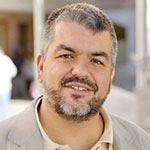 Guillermo Fouce
Profesor de Intervención en Salud Mental
Professor
Licenciado en psicología. Doctor en psicología por la Universidad Complutense, fue becario de investigación (FPI) en dicha universidad. 21 años de experiencia docente como profesor asociado en diferentes universidades compatibilizando siempre la profesión con la docencia. Coordinador de Salud, adicciones y consumo del Ayuntamiento de Getafe. Experto en adicciones por la Universidad Complutense de Madrid. Acreditado como experto intervención social y emergencias por el Consejo General de la Psicología. Presidente Sección psicología Intervención Social del Colegio Oficial de Psicología de Madrid. Fue miembro de la junta de gobierno del Colegio Oficial de la Psicología. Presidente de la Fundación Psicología sin Fronteras. Profesor de Honor de la Universidad Carlos III de Madrid. Sus intereses están centrados en la Intervención Social, la Psicología Social y los Procesos de Participación, la Exclusión Social, Adicciones y la Intervención en Salud Mental. Cuenta con amplia experiencia profesional y como docente y tiene varios libros, capítulos de libros y artículos publicados, el ultimo “Psicología del Miedo” colaborador habitual en medios de comunicación.
Guillermo Fouce
Profesor de Intervención en Salud Mental
Professor
Licenciado en psicología. Doctor en psicología por la Universidad Complutense, fue becario de investigación (FPI) en dicha universidad. 21 años de experiencia docente como profesor asociado en diferentes universidades compatibilizando siempre la profesión con la docencia. Coordinador de Salud, adicciones y consumo del Ayuntamiento de Getafe. Experto en adicciones por la Universidad Complutense de Madrid. Acreditado como experto intervención social y emergencias por el Consejo General de la Psicología. Presidente Sección psicología Intervención Social del Colegio Oficial de Psicología de Madrid. Fue miembro de la junta de gobierno del Colegio Oficial de la Psicología. Presidente de la Fundación Psicología sin Fronteras. Profesor de Honor de la Universidad Carlos III de Madrid. Sus intereses están centrados en la Intervención Social, la Psicología Social y los Procesos de Participación, la Exclusión Social, Adicciones y la Intervención en Salud Mental. Cuenta con amplia experiencia profesional y como docente y tiene varios libros, capítulos de libros y artículos publicados, el ultimo “Psicología del Miedo” colaborador habitual en medios de comunicación.
 Luis García Villameriel
Profesor de Ética y Deontología Profesional
Professor
Licenciado en Psicología por la Universidad Complutense de Madrid. Psicólogo Especialista en Psicología Clínica. Máster en Salud Mental y Clínica Social. Máster EEES en los Retos de la Paz, la Seguridad y la Defensa. Acreditado como Psicólogo de Emergencias por el Consejo General de la Psicología de España. Doctorando en el Programa de Estudios Avanzados en Derechos Humanos, UC3M.
Luis García Villameriel
Profesor de Ética y Deontología Profesional
Professor
Licenciado en Psicología por la Universidad Complutense de Madrid. Psicólogo Especialista en Psicología Clínica. Máster en Salud Mental y Clínica Social. Máster EEES en los Retos de la Paz, la Seguridad y la Defensa. Acreditado como Psicólogo de Emergencias por el Consejo General de la Psicología de España. Doctorando en el Programa de Estudios Avanzados en Derechos Humanos, UC3M.
Veinte años trabajando con organismos internacionales en proyectos de salud mental dirigidos a colectivos vulnerables, en el campo de la cooperación al desarrollo, ayuda humanitaria, y defensa de los derechos humanos. Capitán Psicólogo (RV) en el Cuerpo Militar de Sanidad, he realizado múltiples activaciones en la Unidad Militar de Emergencias, el EMAD-CIFAS y en el Hospital Central de la Defensa “Gómez Ulla”. Durante un año formé parte del equipo de Psicólogos de Guardia del SAMUR-PC como funcionario interino, y posteriormente en un CMS del Ayuntamiento de Madrid.
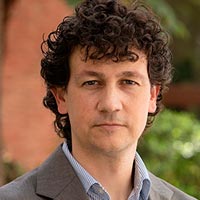 Xavier Hernández Oñativia
Profesor de Evaluación y Diagnóstico Psicológico I
Xavier Hernández Oñativia
Profesor de Evaluación y Diagnóstico Psicológico IProfesor de Evaluación y Diagnóstico Psicológico II Professor Licenciado en Psicología en la especialidad de clínica. Doctor Cum Laude por la Universidad Complutense de Madrid. Diplomado en Ciencias Empresariales. Máster oficial en Evaluación y Rehabilitación Neuropsicológica, Máster en Psicología Sanitario Infanto-Juvenil y Experto Universitario en Intervención en la Ansiedad y el Estrés. Compagino la evaluación con la intervención neuropsicológica y psicológica tanto en población infanto-juvenil como en población adulta. He sido responsable de la elaboración y revisión anual del protocolo interno de Evaluación e Intervención Neuropsicológica en la clínica de Rehabilitación CRL de Madrid. En los últimos años compagino la actividad en la clínica con la docencia universitaria: docencia (Facultad de Psicología de la Universidad Complutense de Madrid) y tutorización de Trabajos Fin de Máster (UCM y Universidad Internacional de Valencia) en el Máster en Psicología General Sanitaria. Desde el 2019 ejerzo como tutor de prácticas – tanto de grado como de máster – de alumnos pertenecientes a diferentes universidades.
 Inés Hoyos Asensio
Profesora de Psicología de la Empresa y de las Organizaciones
Inés Hoyos Asensio
Profesora de Psicología de la Empresa y de las OrganizacionesProfesora de Selección y Formación del Personal
Profesora de Coaching Professor Nacida en Madrid, licenciada en Psicología en la UAM (1.993), Técnico intermedio en Prevención de Riesgos Laborales, especialidad en ergonomía y Psicología aplicada, y en posesión de un Máster en Dirección de personal y Gestión de RR.HH (CAM 2000). Responsable de un Departamento de RRHH en una compañía de desarrollo de Software Aeroespacial que cuenta en la actualidad con más de 400 empleados y que engloba la matriz en España y filiales en Reino Unido, Rumanía y Portugal. Se encarga de la gestión, durante más de 20 años, de las áreas de Selección de Personal, Formación, Prevención de Riesgos Laborales (PRL), Protección de Datos y Laboral .Adicionalmente ejerce en la actualidad como docente en otras instituciones, en diversos programas formativos en el área de los Recursos Humanos, la Responsabilidad Social Corporativa y la Formación y Orientación Laboral, tanto en tanto en modalidad Online como presencial.
 Gabriel Luis Isla Joulain
Profesor de Aprendizaje
Professor
Doble Grado en Psicología y Criminología por la Universidad Pontificia de Comillas (UPCO). Máster en Psicología General Sanitaria por la Universidad Rey Juan Carlos (URJC). Máster en Análisis de la Conducta aplicado al contexto terapéutico por el Instituto Terapéutico de Madrid (ITEMA). Ejerce como psicólogo sanitario con población adulta y adolescente en Libertia Psicología desde la modificación de conducta.
Gabriel Luis Isla Joulain
Profesor de Aprendizaje
Professor
Doble Grado en Psicología y Criminología por la Universidad Pontificia de Comillas (UPCO). Máster en Psicología General Sanitaria por la Universidad Rey Juan Carlos (URJC). Máster en Análisis de la Conducta aplicado al contexto terapéutico por el Instituto Terapéutico de Madrid (ITEMA). Ejerce como psicólogo sanitario con población adulta y adolescente en Libertia Psicología desde la modificación de conducta.
 Jorge Jiménez Serrano
Profesor de Psicología Criminal y Diagnóstico en Psicología Social
Jorge Jiménez Serrano
Profesor de Psicología Criminal y Diagnóstico en Psicología SocialProfesor de Psicología de la Intervención Comunitaria Professor Director de Behavior & Law. Director del Máster en Criminal Profiling de B&L. Psicólogo, Analista Criminal por el Jill Dando Crime Science and Security Institute y el College London University, Especialista en Psicopatología Criminal y Forense por el Mental Health, Law and Policy Institute de la Simon Fraser University (Canadá) y la Universidad Camilo José Cela. Es autor de varios libros relacionados con el Análisis Criminal y Forense, siendo capacitador de diversas fuerzas policiales a nivel internacional. Psicólogo Forense y Criminalista en práctica privada.
 Lenny Liz
Profesora Personalidad y Diferencias Individuales
Professor
Licenciada en Psicología por la Universidad Autónoma de Santo Domingo (República Dominicana). Máster en Psicología de la Educación por la Universidad de Murcia y Doctora por la Universidad de Barcelona. Sus líneas de investigación son diversas, destacando la investigación en Atención Temprana, estilos de apego, estilos parentales y diferencias individuales. Ha publicado artículos en revistas especializadas, así como, diversos capítulos de libros con prestigiosas editoriales.
Lenny Liz
Profesora Personalidad y Diferencias Individuales
Professor
Licenciada en Psicología por la Universidad Autónoma de Santo Domingo (República Dominicana). Máster en Psicología de la Educación por la Universidad de Murcia y Doctora por la Universidad de Barcelona. Sus líneas de investigación son diversas, destacando la investigación en Atención Temprana, estilos de apego, estilos parentales y diferencias individuales. Ha publicado artículos en revistas especializadas, así como, diversos capítulos de libros con prestigiosas editoriales.
 Raúl López Beltrán
Profesor de Evaluación y Diagnóstico Psicológico I
Professor
Graduado en Psicología, Máster de Especialista en Psicoterapia de niños y adolescentes en Centro de Psicoterapia y Formación QUIPÚ. Cursando Máster en Psicología General Sanitaria. Experiencia en psicoterapia de niños, adolescentes y adultos en Centro de Psicoterapia y Formación QUIPÚ, ámbito en el que he desarrollado la práctica psicoterapéutica en los últimos años. Experiencia el ámbito sociosanitario en el área de adicciones y exclusión social, aplicando intervenciones en pacientes vulnerables con diferentes necesidades, en Asociación Atiempo. Actualmente, docente universitario en el Grado de Psicología y en el Máster Universitario en Formación del Profesorado de Educación Secundaria, Obligatoria y Bachillerato, impartiendo asignaturas del área de psicología.
Raúl López Beltrán
Profesor de Evaluación y Diagnóstico Psicológico I
Professor
Graduado en Psicología, Máster de Especialista en Psicoterapia de niños y adolescentes en Centro de Psicoterapia y Formación QUIPÚ. Cursando Máster en Psicología General Sanitaria. Experiencia en psicoterapia de niños, adolescentes y adultos en Centro de Psicoterapia y Formación QUIPÚ, ámbito en el que he desarrollado la práctica psicoterapéutica en los últimos años. Experiencia el ámbito sociosanitario en el área de adicciones y exclusión social, aplicando intervenciones en pacientes vulnerables con diferentes necesidades, en Asociación Atiempo. Actualmente, docente universitario en el Grado de Psicología y en el Máster Universitario en Formación del Profesorado de Educación Secundaria, Obligatoria y Bachillerato, impartiendo asignaturas del área de psicología.
 Miriam Martín Bernárdez
Profesora de Psicología de los Grupos
Professor
Licenciada en Psicología por la Universidad CEU San Pablo y Graduada en Criminología por la Universidad Europea de Madrid llevó más de 10 años ejerciendo como psicóloga general sanitaria (actualmente en la Clínica Despertares) y compatibilizo con mi rol de docente en distintas áreas (opositores para Policía Nacional, practicum máster habilitante de psicología y tutora de TFM) y creadora de contenido académico para distintas universidades tanto nacionales como internacionales.
Miriam Martín Bernárdez
Profesora de Psicología de los Grupos
Professor
Licenciada en Psicología por la Universidad CEU San Pablo y Graduada en Criminología por la Universidad Europea de Madrid llevó más de 10 años ejerciendo como psicóloga general sanitaria (actualmente en la Clínica Despertares) y compatibilizo con mi rol de docente en distintas áreas (opositores para Policía Nacional, practicum máster habilitante de psicología y tutora de TFM) y creadora de contenido académico para distintas universidades tanto nacionales como internacionales.
 Luis Martínez Guerrero
Profesor de Historia de la Psicología
Luis Martínez Guerrero
Profesor de Historia de la PsicologíaProfesor de Motivación y Emoción
Profesor de Psicología del Lenguaje Professor Licenciado y Doctor en Psicología por la Universidad Autónoma de Madrid en donde ha sido profesor de Percepción y Atención, Filosofía de la Ciencia, e Historia de la Psicología. Ha sido investigador visitante en distintas universidades europeas y españolas. Pertenece al grupo de investigación sobre Psicología y Cultura de la UAM. Ha editado y publicado diversos capítulos de libro y artículos en publicaciones nacionales e internacionales sobre sus líneas de investigación: la Psicología Cultural, la Antropología filosófica, la Historia de las emociones y la genealogía de la subjetividad moderna. Actualmente es profesor de Antropología de la Salud en el Centro Universitario San Rafael Nebrija y profesor de las asignaturas de Historia de la Psicología, Psicología del lenguaje, y Motivación y Emoción en el grado de Psicología de la Facultad de Ciencias de la Vida y de la Naturaleza de la Universidad Nebrija.
 Susana Méndez Gago
Profesora de Personalidad y Diferencias Individuales
Susana Méndez Gago
Profesora de Personalidad y Diferencias IndividualesProfesora de Psicología de los Grupos Professor Psicóloga Clínica. Doctora Acreditada en Educación y Ciencias Sociales por la UCJC, Experta en Educación para la Salud y Especialista en dirección de Fundaciones. Desde 1989 ha desarrollado proyectos de intervención social en distintos colectivos en situación de vulnerabilidad y riesgo de exclusión social. Ha sido directora de la Cátedra de Desarrollo Social en la UCJC, también de Fundación GE Social y Jefe de Desarrollo de Programas en la FAD. Asimismo, desarrolla su labor como psicóloga clínica desde el año 2003. Ha participado en numerosas investigaciones, artículos y libros.
 Marta Méndez Rico
Profesora Psicología de los Grupos
Professor
Psicoterapeuta y Docente Universitaria.
Marta Méndez Rico
Profesora Psicología de los Grupos
Professor
Psicoterapeuta y Docente Universitaria.
Graduada en Psicología, Máster en Psicología General Sanitaria y Doctoranda en Neurociencias por la Universidad San Pablo CEU.
Profesora de Personalidad y Diferencias Individuales y Psicología del Pensamiento en UNIE Universidad.
Docente del Título Propio de Habilidades Interpersonales Profesionales en USP CEU.
Especialista en Trastornos de la Personalidad. Experta en Terapia de Pareja e Intervención Infantojuvenil. Formación en Abuso Sexual, TCA, Imagen Corporal y Trastornos Disociativos.
Actividad Asistencial en consulta privada desde 2018, principalmente con población adolescente y adulta con Patología de Personalidad, Patología Dual, Alimenticia y Trastornos del Vínculo.
Desarrollo de Evaluaciones Neuropsicológicas, especialmente enfocadas a Trastornos del Espectro Autista, Alta Capacidad y Déficit de Atención con Hiperactividad.
Investigación y publicación de Guías de Intervención, Manuales y Artículos.
Anteriormente Generalista de Recursos Humanos en Multinacional del Sector Financiero.
 Virginia Navarro Mangado
Profesora de Psicología del Consumo y del Marketing
Professor
Doctora en Comunicación Audiovisual y Publicidad por la Universidad Complutense de Madrid.
Desde 1992 ha desarrollado su actividad profesional como Consultora de Comunicación, especialista en Procesos de Influencia, así como docente en grados y postgrados universitarios, (Universidad Nebrija y UCM) y ciclos técnicos superiores (Cámara de Comercio de Madrid)
Labor investigadora “La incidencia de las campañas electorales en la construcción de la imagen de los hospitales. Las crisis en los hospitales madrileños.” Tesis doctoral. (2015). UCM. Especializada como Docente en Responsabilidad Social Corporativa dentro del grado en Comunicación Corporativa, Protocolo y Organización de Eventos.
Directora de Comunicación, Marketing y Recursos Humanos en Security World Wide, S.L.: Diseño, organización y ejecución de las estrategias comerciales y de promoción de los espacios dedicados a organización de eventos y espacios de ventas temporales.
Virginia Navarro Mangado
Profesora de Psicología del Consumo y del Marketing
Professor
Doctora en Comunicación Audiovisual y Publicidad por la Universidad Complutense de Madrid.
Desde 1992 ha desarrollado su actividad profesional como Consultora de Comunicación, especialista en Procesos de Influencia, así como docente en grados y postgrados universitarios, (Universidad Nebrija y UCM) y ciclos técnicos superiores (Cámara de Comercio de Madrid)
Labor investigadora “La incidencia de las campañas electorales en la construcción de la imagen de los hospitales. Las crisis en los hospitales madrileños.” Tesis doctoral. (2015). UCM. Especializada como Docente en Responsabilidad Social Corporativa dentro del grado en Comunicación Corporativa, Protocolo y Organización de Eventos.
Directora de Comunicación, Marketing y Recursos Humanos en Security World Wide, S.L.: Diseño, organización y ejecución de las estrategias comerciales y de promoción de los espacios dedicados a organización de eventos y espacios de ventas temporales.
 Ashley Navarro McCarthy
Profesora de Historia de la Psicología
Ashley Navarro McCarthy
Profesora de Historia de la PsicologíaProfesora de Motivación y Emoción Professor Doctoranda en Psicología, con Máster en Psicología General Sanitaria (2020) y título de Especialización en Práctica en Psicología Clínica por la Universidad Complutense de Madrid (2021). Bilingüe en inglés y español. Desde 2020, es investigadora en el área de Psicología Clínica y forma parte del grupo de investigación en intervención y tratamiento en psicología clínica y de la salud, enfocándose en el estudio de eventos traumáticos. Sus áreas de investigación incluyen las consecuencias psicopatológicas de los atentados terroristas y su tratamiento, así como las consecuencias de la pandemia de COVID-19 y su atención psicológica, colaborando con la Universidad Complutense de Madrid y la Universidad de Liverpool. Además de presentar ponencias en congresos y producir publicaciones científicas, actualmente es coordinadora del Grupo de Trabajo sobre Terrorismo y Construcción de la Paz de la Asociación Internacional de Psicología Aplicada (IAAP).
 María Dolores Nieto Cañaveras
Profesora de Psicometría
Professor
María Dolores Nieto es graduada en Psicología, máster en Metodología de las Ciencias del Comportamiento y de la Salud con Trabajo Fin de Máster calificado con Matrícula de Honor, y doctora en Psicología Clínica y de la Salud con mención internacional por la Universidad Autónoma de Madrid. Entre el 2016 y el 2018, durante la realización de su tesis doctoral, estuvo contratada en prácticas en la Cátedra de Modelos y Aplicaciones Psicométricos (Universidad Autónoma de Madrid–Instituto de Ingeniería del Conocimiento). En 2017 fue premiada con la Ayuda Julio Olea a Jóvenes Investigadores por la Asociación Española de Metodología de las Ciencias del Comportamiento y de la Salud. Su actividad investigadora se centra en los test adaptativos informatizados, el análisis factorial y de la dimensionalidad, y los sesgos de respuesta. Ha publicado en revistas internacionales de reconocido prestigio tales como Psychological Assessment y ha realizado numerosas contribuciones a congresos nacionales e internacionales. Forma parte del equipo de investigación Modelos y Aplicaciones Psicométricas de la Universidad Autónoma de Madrid y participa en varios proyectos de investigación de distinta índole. Asimismo, trabaja en el desarrollo de software y herramientas interactivas relacionadas con la psicometría y el análisis de datos para uso docente, aplicado e investigador. También tiene experiencia docente en cursos sobre manejo de software para el análisis estadístico. Actualmente es profesora del grado en Psicología en la Universidad Antonio de Nebrija, donde imparte las asignaturas de Análisis de Datos en Psicología, Psicometría y Evaluación y Diagnóstico Psicológico I.
María Dolores Nieto Cañaveras
Profesora de Psicometría
Professor
María Dolores Nieto es graduada en Psicología, máster en Metodología de las Ciencias del Comportamiento y de la Salud con Trabajo Fin de Máster calificado con Matrícula de Honor, y doctora en Psicología Clínica y de la Salud con mención internacional por la Universidad Autónoma de Madrid. Entre el 2016 y el 2018, durante la realización de su tesis doctoral, estuvo contratada en prácticas en la Cátedra de Modelos y Aplicaciones Psicométricos (Universidad Autónoma de Madrid–Instituto de Ingeniería del Conocimiento). En 2017 fue premiada con la Ayuda Julio Olea a Jóvenes Investigadores por la Asociación Española de Metodología de las Ciencias del Comportamiento y de la Salud. Su actividad investigadora se centra en los test adaptativos informatizados, el análisis factorial y de la dimensionalidad, y los sesgos de respuesta. Ha publicado en revistas internacionales de reconocido prestigio tales como Psychological Assessment y ha realizado numerosas contribuciones a congresos nacionales e internacionales. Forma parte del equipo de investigación Modelos y Aplicaciones Psicométricas de la Universidad Autónoma de Madrid y participa en varios proyectos de investigación de distinta índole. Asimismo, trabaja en el desarrollo de software y herramientas interactivas relacionadas con la psicometría y el análisis de datos para uso docente, aplicado e investigador. También tiene experiencia docente en cursos sobre manejo de software para el análisis estadístico. Actualmente es profesora del grado en Psicología en la Universidad Antonio de Nebrija, donde imparte las asignaturas de Análisis de Datos en Psicología, Psicometría y Evaluación y Diagnóstico Psicológico I.
 María Nuñez Bernardos
Profesora de Psicología del Desarrollo I
Professor
Licenciada y Doctora en Psicología por la Universidad Autónoma de Madrid. Durante 25 años desempeñó su carrera académica en el Reino Unido. Comenzó como investigadora postdoctoral en la Universidad de Oxford y fue profesora e investigadora en las Universidades de Kent, Glasgow Caledonian y King’s College London. También en el Reino Unido ha sido investigadora invitada en diversos centros de prestigio, entre otros el Center for Brain and Cognitive Development (CBCD), Wales Autism Reserach Center (WARC) y St John’s College, Oxford. Retornó a España en 2020 como investigadora distinguida Beatriz Galindo Senior, programa de atracción de talento del Ministerio de Ciencia y Universidades cuyo objetivo es traer la experiencia de académicos internacionales a las universidades españolas. Es experta en desarrollo temprano y neurodiversidad, áreas en las que ha completado numerosos proyectos de investigación como IP y publicado con sus colaboradores. Desde enero de 2024 es profesora agregada de la Universidad Nebrija donde ha comenzado un proyecto para la creación de un centro de desarrollo temprano y neurodiversidad. Como especialista en neurodesarrollo es miembro del comité ejecutivo de la Jean Piaget Society y de las redes de investigación Respect for Neurodevelopment y REAL (Red de investigación en Autismo Latinoamérica).
María Nuñez Bernardos
Profesora de Psicología del Desarrollo I
Professor
Licenciada y Doctora en Psicología por la Universidad Autónoma de Madrid. Durante 25 años desempeñó su carrera académica en el Reino Unido. Comenzó como investigadora postdoctoral en la Universidad de Oxford y fue profesora e investigadora en las Universidades de Kent, Glasgow Caledonian y King’s College London. También en el Reino Unido ha sido investigadora invitada en diversos centros de prestigio, entre otros el Center for Brain and Cognitive Development (CBCD), Wales Autism Reserach Center (WARC) y St John’s College, Oxford. Retornó a España en 2020 como investigadora distinguida Beatriz Galindo Senior, programa de atracción de talento del Ministerio de Ciencia y Universidades cuyo objetivo es traer la experiencia de académicos internacionales a las universidades españolas. Es experta en desarrollo temprano y neurodiversidad, áreas en las que ha completado numerosos proyectos de investigación como IP y publicado con sus colaboradores. Desde enero de 2024 es profesora agregada de la Universidad Nebrija donde ha comenzado un proyecto para la creación de un centro de desarrollo temprano y neurodiversidad. Como especialista en neurodesarrollo es miembro del comité ejecutivo de la Jean Piaget Society y de las redes de investigación Respect for Neurodevelopment y REAL (Red de investigación en Autismo Latinoamérica).
 Jesús Olea Ferreras
Tutor de TFG/Prácticas
Tutor TFG/Internships
Enfermero Especialista en Salud Mental en el Centro de Salud Mental de Rivas-Vaciamadrid.
Jesús Olea Ferreras
Tutor de TFG/Prácticas
Tutor TFG/Internships
Enfermero Especialista en Salud Mental en el Centro de Salud Mental de Rivas-Vaciamadrid.Secretario Comisión de Humanización Salud Mental Hospital Sureste.
Doctor en Psicología Cínica y de la Salud por la UAM.
Jesús Olea Ferreras es Enfermero Especialista en Salud Mental en el Centro de Salud Mental de Rivas Vaciamadrid perteneciente al Hospital del Sureste. Trabajó en el Hospital Universitario Infanta Cristina 13 años. Miembro de la Comisión de Investigación del HUIC y de la Comisión de Innovación y Desarrollo del Hospital Universitario Puerta de Hierro Majadahonda. Es Doctor en Psicología Biológica y de la Salud de la UAM desde septiembre de 2017 con la tesis leída el 11 de septiembre del 2017: “Experiencia y afrontamiento en pacientes en tratamiento con quimioterapia desde la psicología positiva” con nota de Sobresaliente Cum Laude. Tiene el Bachelor on Nursing por la Hogeschool Zeeland (Holanda) Obtuvo el DEA en la UAM con la investigación “Estrés aculturativo y distrés psicológico asociado en inmigrantes de la CAM”.
Fue profesor asociado de la asignatura de Enfermería de Salud Mental el curso 2015-2016 en la Universidad Europea de Madrid. Y tutor de TFGs de los alumnos de Grado en Enfermería de la Facultad de Ciencias de la Salud San Rafael Nebrija en los cursos 2019-2020, 2020-2021 y 2021-2022. En el curso 2020-2021 fue profesor de la Asignatura de Cuidados de Enfermería en Drogodependencias (optativa para Enfermería y Fisioterapia); así como de la Asignatura de Prácticas Básicas de Enfermería. Desarrollando su labor online de manera síncrona durante el curso académico con aprovechamiento de la Plataforma Blackboard Ultra, el Campus Virtual, SPS; así como el Lock Responder Browser en los exámenes.
Jesús trabajó en Ntra. Sra. de la Paz (HH San Juan de Dios; se diplomó en la Universidad de Comillas). Trabajó UHBs de: La Princesa, Henares e Infanta Cristina. En La Princesa elaboró y participó en programas de SM; y fue tutor pregrado de enfermería. En los NNHH ha sido coordinador y docente de Salud Mental para la capacitación del personal de enfermería, médico y subalterno. Como supervisor de Psiquiatría del HUIC creó y coordinó durante cerca de 10 años el grupo posteriormente convertido en Comisión de Enfermería de Salud Mental. Posteriormente entró a formar parte del Grupo de Trabajo de Hospitales en la ORCSM y fue secretario de la Comisión Consultiva de Cuidados durante alrededor de 5 años. Fue tutor general de la UDM SM del HUIC siendo tutor de rotación y de investigación de los EIR. Colaboró en la docencia en el IPSSM José Germain de Leganés. Es miembro de la Comisión de Investigación del HUIC y lo fue de la Facultad de Enfermería, Fisioterapia y Podología de la UCM; de las Subcomisiones de Docencia del HUIC y de la UDM SM IPSSM José Germain. Colaboró con Caritas donde ha sido ponente y coordinador de un grupo de trabajo sobre Inmigración y Salud Mental en unas Jornadas y ponente en un ciclo de conferencias en el Albergue de San Juan de Dios con el mismo tema. En otras Jornadas sobre Psiquiatría transcultural en IPSSM José Germain de Leganés. Miembro del Grupo Investigación UAM “GIPSY” realizando el Proyecto coordinado I+D+I “Dinámicas de la identidad y gestión distribuida del conocimiento en culturas de aprendizaje y socialización. Publicaciones: Capítulo del libro “Manual de procedimientos de enfermería de Salud Mental Comunitaria en la Comunidad de Madrid. Planificación estratégica”. Planes de Cuidados en pacientes con Trastorno Límite de Personalidad; “Aplicabilidad del modelo de autocuidado de D. Orem: elaboración de un registro de valoración inicial integrado para atención primaria y atención especializada”; “Adherencia en pacientes psicóticos”, “Estrés aculturativo y distrés psicológico asociado en inmigrantes de la CAM”, y “Necesidades psicosociales desde la narrativa. Análisis de textos espontáneos”. Actualmente desarrolla como coordinador y docente cursos de formación continuada relacionados con la prevención del desgaste profesional de los profesionales de la salud como parte fundamental de la humanización de los mismos para una mejor calidad de la asistencia sanitaria. Habiendo desarrollado los cursos: “Prevención del desgaste profesional en Enfermería” en la Escuela Madrileña de la Salud en el año 2018; “Autocuidado del profesional” en junio del 2019 para profesionales de atención primaria en la Dirección de Formación; y “Preparación psicológica al profesional ante enfermedades crónicas de mal pronóstico y muerte” en junio del mismo año en el HUIC. Así mismo, en el año 2021 ha sido coordinador y docente de un curso de Proyectos de investigación en Enfermería desarrollado en el Hospital Universitario Infanta Cristina desarrollado entre los meses de febrero a junio. En el presente año ha sido docente del curso “Metodología y lenguaje enfermero en salud mental. Actualización en cuidados de enfermería” celebrado en el Hospital Doctor Rodríguez Lafora en mayo y junio del presente año.
Como continuación de la línea de investigación de la tesis está elaborándose un programa de Educación para la Salud impartido por pacientes empoderados de la AECC, que se realizará de manera online debido a las limitaciones de presencialidad de la pandemia, en la que se explorarán el afrontamiento y la experiencia de la enfermedad mediante las mismas herramientas de la tesis además de incidir en el estudio de diario que quedó inconcluso por falta de casos haciendo hincapié en entrevistas semiestructuradas y un cuestionario de compartimiento social de las emociones.
 Mario Paños Gómez
Profesor de Psicología del Deporte
Professor
Licenciado en Psicología por la UAM, y Máster en Psicología de la Actividad Física y del Deporte UAM-COE, comencé mi trabajo en dicha Universidad en su Centro de Psicología Aplicada al Deporte antes incluso de terminar mis estudios, donde trabajé 8 años. Además de la labor docente en el Grado y el Máster (profesor, tutor de prácticas y TFM y Tribunal de evaluación), fui responsable de áreas de psicología deportiva en clubes de baloncesto, tenis, judo, padel, automovilismo, además de trabajar para proyectos de deporte y discapacidad, formativos, y trabajo de intervención individual con deportistas, padres y entrenadores.
En la actualidad, y desde hace casi cuatro años, trabajo en Máximo Rendimiento, empresa que creé con mi socio. Poco a poco hemos conseguido que ahora esté trabajando con deportistas de élite preparando desde campeonatos regionales hasta ciclos olímpicos y campeonatos del mundo. Trabajo como responsable del Área de Psicología Deportiva en un Club de Judo y otro de Baloncesto, y soy el Psicólogo Deportivo de referencia de la Selección Española de Judo, trabajando en el CAR de Madrid, así como responsable de la preparación mental de pilotos, judokas, ciclistas, jugadores de baloncesto, estudiantes, opositores... Siempre donde esté el deportista, siempre buscando su máximo rendimiento.
Mario Paños Gómez
Profesor de Psicología del Deporte
Professor
Licenciado en Psicología por la UAM, y Máster en Psicología de la Actividad Física y del Deporte UAM-COE, comencé mi trabajo en dicha Universidad en su Centro de Psicología Aplicada al Deporte antes incluso de terminar mis estudios, donde trabajé 8 años. Además de la labor docente en el Grado y el Máster (profesor, tutor de prácticas y TFM y Tribunal de evaluación), fui responsable de áreas de psicología deportiva en clubes de baloncesto, tenis, judo, padel, automovilismo, además de trabajar para proyectos de deporte y discapacidad, formativos, y trabajo de intervención individual con deportistas, padres y entrenadores.
En la actualidad, y desde hace casi cuatro años, trabajo en Máximo Rendimiento, empresa que creé con mi socio. Poco a poco hemos conseguido que ahora esté trabajando con deportistas de élite preparando desde campeonatos regionales hasta ciclos olímpicos y campeonatos del mundo. Trabajo como responsable del Área de Psicología Deportiva en un Club de Judo y otro de Baloncesto, y soy el Psicólogo Deportivo de referencia de la Selección Española de Judo, trabajando en el CAR de Madrid, así como responsable de la preparación mental de pilotos, judokas, ciclistas, jugadores de baloncesto, estudiantes, opositores... Siempre donde esté el deportista, siempre buscando su máximo rendimiento.
 Susana Piqueras
Profesora de Motivación y Emoción
Professor
Licenciada en Psicología, Máster en Prevención de riesgos laborales en la especialidad de Ergonomía y Psicosociología y Doctora en Estudios Interdisciplinares de Género. Cuenta con casi 15 años como psicóloga en el ámbito laboral y como docente en asignaturas pertenecientes al Máster en Psicología General Sanitaria y al Máster en Formación del Profesorado de Educación Secundaria. También ha asumido labores de tutorización de trabajo de fin de máster en ambas titulaciones. Ha colaborado en diferentes proyectos de investigación relacionados con mujeres en situación sin hogar, participando en la actualidad en el proyecto “Intervención psicológica con mujeres en situación sin hogar. Propuesta de tratamiento y evaluación de la eficacia” Plan Nacional I+D+i del Ministerio de ciencia e Innovación. Agencia Estatal de Investigación.
Susana Piqueras
Profesora de Motivación y Emoción
Professor
Licenciada en Psicología, Máster en Prevención de riesgos laborales en la especialidad de Ergonomía y Psicosociología y Doctora en Estudios Interdisciplinares de Género. Cuenta con casi 15 años como psicóloga en el ámbito laboral y como docente en asignaturas pertenecientes al Máster en Psicología General Sanitaria y al Máster en Formación del Profesorado de Educación Secundaria. También ha asumido labores de tutorización de trabajo de fin de máster en ambas titulaciones. Ha colaborado en diferentes proyectos de investigación relacionados con mujeres en situación sin hogar, participando en la actualidad en el proyecto “Intervención psicológica con mujeres en situación sin hogar. Propuesta de tratamiento y evaluación de la eficacia” Plan Nacional I+D+i del Ministerio de ciencia e Innovación. Agencia Estatal de Investigación.
 Manuel Reiriz Rojas
Profesor de Bases Biológicas de la Conducta
Manuel Reiriz Rojas
Profesor de Bases Biológicas de la ConductaProfesor de Psicología Fisiológica Professor Doctor en Biología por la universidad de Sevilla, cursando el Máster oficial de Fisiología y Neurociencia. Ha ejercido docencia en el departamento de Psicobiología de la Universidad de Sevilla y en la Universidad Antonio Nebrija en el Máster de formación del profesorado. Cuenta con experiencia tanto en el campo de la neurociencia y su enseñanza como en el de educación. Posee Igualmente publicaciones en el ámbito de la Psicobiología y en el de la innovación docente.
 Jennifer Angelika Rieker
Profesora de Diseños de Investigación en Psicología
Professor
Jennifer Angelika Rieker
Profesora de Diseños de Investigación en Psicología
Professor
 Elena Robles López
Profesora de Bases Biológicas de la Conducta
Elena Robles López
Profesora de Bases Biológicas de la ConductaProfesora de Intervención y Tratamientos Psicológicos II Professor Graduada en Psicología por la Universidad de Granada y Máster en Neurociencias básicas, aplicadas y dolor. Actualmente finalizando la tesis doctoral en la Universidad Complutense de Madrid (UCM) sobre mecanismos atencionales implicados en el dolor. Ha colaborado en distintos equipos de investigación implicados en el estudio de distintos temas como adicciones a sustancias, sesgos cognitivos y psicología positiva, además de realizar una estancia de investigación en el departamento de Psicología Experimental de la Salud de la Universidad de Maastricht. Su labor investigadora le ha llevado a participar en varios congresos nacionales e internacionales presentando distintos estudios de investigación. Además, cuenta con varios años de experiencia como docente en el área de psicología clínica y neurociencia.
 Benjamín Rodríguez Expósito
Tutor TFG/Prácticas
TFG/Internship Tutor
Doctor en Biología. Máster universitario de especialización en Fisiología y Neurociencia, Licenciado en Biología. Actualmente ejerce como docente en diversas asignaturas del Grado de Psicología en la Universidad Nacional de Educación a Distancia (UNED), así como profesor en el Master de Formación del profesorado y el Master en cognición y emoción en contextos educativos de la Universidad Antonio de Nebrija. Asimismo, a lo largo de su carrera como docente ha impartido docencia teórica y práctica en diversas asignaturas troncales, obligatorias y optativas del Grado de Psicología, desarrollando dicha actividad docente en diversas universidades como la Universidad de Sevilla y la Universidad de Huelva; también ha participado como tutor de Trabajos Fin de Master tanto en el máster universitario de Fisiología y Neurociencia de la Universidad de Sevilla, como en el Máster Universitario en Formación del Profesorado de la Universidad Antonio de Nebrija.
En cuanto a su producción científica, es autor/coautor de diversas publicaciones científicas en revistas de reconocido prestigio e incluidas en el journal citation report, tales como Behavioural Brain Research, Physiology and Behaviour, Neurobiology of learning and memory y Brain, structure and funtion. Contando las mismas con un alto índice de impacto y con posiciones destacadas dentro del campo de estudio de la neurociencia. Asimismo, ha participado en cursos, seminarios de especialización y congresos científicos tanto nacionales como internacionales, contribuyendo en estos últimos con diversas publicaciones. Ha participado como investigador en varios proyectos de investigación nacionales dentro del Plan Nacional de I+D del Gobierno de España relacionados con el estudio de las bases neurales del aprendizaje y la memoria.
Benjamín Rodríguez Expósito
Tutor TFG/Prácticas
TFG/Internship Tutor
Doctor en Biología. Máster universitario de especialización en Fisiología y Neurociencia, Licenciado en Biología. Actualmente ejerce como docente en diversas asignaturas del Grado de Psicología en la Universidad Nacional de Educación a Distancia (UNED), así como profesor en el Master de Formación del profesorado y el Master en cognición y emoción en contextos educativos de la Universidad Antonio de Nebrija. Asimismo, a lo largo de su carrera como docente ha impartido docencia teórica y práctica en diversas asignaturas troncales, obligatorias y optativas del Grado de Psicología, desarrollando dicha actividad docente en diversas universidades como la Universidad de Sevilla y la Universidad de Huelva; también ha participado como tutor de Trabajos Fin de Master tanto en el máster universitario de Fisiología y Neurociencia de la Universidad de Sevilla, como en el Máster Universitario en Formación del Profesorado de la Universidad Antonio de Nebrija.
En cuanto a su producción científica, es autor/coautor de diversas publicaciones científicas en revistas de reconocido prestigio e incluidas en el journal citation report, tales como Behavioural Brain Research, Physiology and Behaviour, Neurobiology of learning and memory y Brain, structure and funtion. Contando las mismas con un alto índice de impacto y con posiciones destacadas dentro del campo de estudio de la neurociencia. Asimismo, ha participado en cursos, seminarios de especialización y congresos científicos tanto nacionales como internacionales, contribuyendo en estos últimos con diversas publicaciones. Ha participado como investigador en varios proyectos de investigación nacionales dentro del Plan Nacional de I+D del Gobierno de España relacionados con el estudio de las bases neurales del aprendizaje y la memoria.
 Elisa Rodríguez Ortega
Profesora de Atención, Percepción y Memoria
Elisa Rodríguez Ortega
Profesora de Atención, Percepción y MemoriaProfesora de Neuropsicología Professor Licenciada en Psicología, Máster en Investigación en Salud Mental (Neurotoxicología), Máster en Orientación Educativa Familiar, Doctora en Salud, Psicología y Psiquiatría por la Universidad de Almería. Líneas de investigación relacionadas con la regulación emocional, las etapas predependientes de adicción, las enfermedades neurodegenerativas y los trastornos de la conducta alimentaria. Autora de diversos artículos científicos publicados en revistas indexadas. Review editor en Frontiers in Behavioral Neuroscience.
 Álvaro Ruiz García
Profesor de Psicología del Desarrollo II
Álvaro Ruiz García
Profesor de Psicología del Desarrollo IIProfesor de Psicopatología I
Profesor de Evaluación y Diagnóstico Psicológico I Professor Graduado en Psicología, Máster en Neurociencia y Máster en Psicología General Sanitaria por la Universidad Complutense de Madrid. Actualmente, compagina la docencia en la Universidad Nebrija y la Universitat Oberta de Catalunya con su labor como neurocientífico en el Hospital Universitario 12 de Octubre de Madrid. Su trabajo se centra en desentrañar la compleja relación entre la función afectiva y los procesos cognitivos en envejecimiento sano y patológico. Ha complementado su trayectoria profesional como neuropsicólogo clínico y psicólogo sanitario, trabajando con personas con daño cerebral adquirido y con personas con trastorno límite de la personalidad.
 Estefanía Sánchez Pastor Martín
Profesora de Psicometría
Estefanía Sánchez Pastor Martín
Profesora de PsicometríaProfesora de Introducción a la Estadística en Psicología
Profesora de Análisis de Datos en Psicología Professor Graduada en Psicología por la Universidad Complutense de Madrid (2013). Continuó su especialización realizando el Máster U. en Neuropsicología en la Universidad de Salamanca (2015), gracias al cual centró su interés en el análisis de datos aplicados a la neurociencia (neuronas espejo, arquitectura funcional de la representación motora, Alzheimer y otras demencias). Profundizó en este campo completando su formación con el Máster U. en Metodología de las Ciencias del Comportamiento y la Salud en la Universidad Autónoma de Madrid (2018). En los últimos años, su ocupación profesional se centra en tareas de asesoramiento metodológico (diseño y análisis estadístico de datos) en trabajos de investigación y otros proyectos en diferentes áreas de estudio (socio sanitarias principalmente). De forma complementaria, desempeña actividades docentes en diferentes niveles académicos y formatos educativos.
 Ana Sanz Cortés
Profesora de Psicooncología
Ana Sanz Cortés
Profesora de PsicooncologíaProfesora de Psicopatología II Professor Licenciada en Psicología y Doctora por la Universidad Complutense de Madrid, con premio extraordinario de Doctorado. Además, es Máster en Psicooncología y Cuidados Paliativos y en Neuropsicología Clínica. A nivel docente cuente con experiencia tanto en Grado como en Master y cursos de postrgrado, impartidos por diferentes Universidades. Actualmente forma parte del Grupo de Investigación de Victimología de la UCM, con líneas de investigación centradas en el daño cognitivo de los pacientes oncológicos. Cuenta con la participación en más de una decena de artículos científicos y capítulos de libros, así como en Congresos ámbito nacional e internacional. A nivel clínico, cuenta con más de quince años de experiencia clínica principalmente en población oncológica y actualmente coordina el Departamento de Psicooncología en la entidad GenesisCare.
 Angélica Millie Soria Claros
Profesora de Psicología Educativa
Angélica Millie Soria Claros
Profesora de Psicología EducativaProfesora de Psicogerontología
Profesora de Personalidad y Diferencias Individuales Professor Licenciada en Psicología por la Universidad Complutense de Madrid, máster en Neuropsicología Clínica y máster en psicología clínica (Habilitación sanitaria). Máster Universitario en profesorado de secundaria (especialidad orientación educativa). Doctora en un programa conjunto de Ciencias de la Visión por la universidad Complutense de Madrid, Universidad de Murcia, Universidad de Santiago de Compostela y Universidad de Valladolid. Especialista en Neuropsicología Infantojuvenil (Trastornos del Neurodesarrollo). Ha desarrollado su carrera docente en distintas instituciones como profesora de grado y postgrado, tutora de TFG/TFM y tutora de prácticas de alumnos de distintas universidades. Rama de investigación en Neurociencias, Psicología del Comportamiento y Enfermedades Psicosomáticas.
 María Vaillo Rodríguez
Profesora de Psicología Educativa
Professor
María Vaíllo es Licenciada en Psicología por la Universidad de Salamanca y Doctora en Educación por la Universidad Complutense de Madrid. Ha trabajado en organismos como el Centro Nacional de Innovación e Investigación Educativa (CNIIE) y universidades como la UNED o la Universidad Camilo José Cela. En la actualidad, es profesora permanente y directora del Servicio de Investigación de la Universidad Antonio de Nebrija. Su trabajo gira en torno a dos grandes de investigación: funciones ejecutivas y aprendizaje, y género y educación.
María Vaillo Rodríguez
Profesora de Psicología Educativa
Professor
María Vaíllo es Licenciada en Psicología por la Universidad de Salamanca y Doctora en Educación por la Universidad Complutense de Madrid. Ha trabajado en organismos como el Centro Nacional de Innovación e Investigación Educativa (CNIIE) y universidades como la UNED o la Universidad Camilo José Cela. En la actualidad, es profesora permanente y directora del Servicio de Investigación de la Universidad Antonio de Nebrija. Su trabajo gira en torno a dos grandes de investigación: funciones ejecutivas y aprendizaje, y género y educación.
 Ana Isabel Valera Rubio
Profesora de Psicología de la Empresa y de las Organizaciones
Professor
Licenciada en Psicología por la Universidad Autónoma de Madrid, máster en Educación y nuevas tecnologías por la Universitat Oberta de Catalunya y máster en Dirección de RRHH en EAE Business School. Cuenta con más de 15 años de experiencia en el sector de RRHH, donde ha gestionado proyectos de evaluación y desarrollo de competencias para empresas como BBVA, CORREOS, ADIF o PROSEGUR, así como gestión de proyectos y liderazgo del departamento de People Analytics en SECURITAS DIRECT. Actualmente es Head of People Analytics en PDA HR TECH, docente en diversas escuelas de negocio y universidades, y es miembro del consejo asesor de IA+IGUAL (proyecto financiado por Fondos europeos, para analizar y verificar los algoritmos que se usan en el mercado laboral, fomentando un uso ético y responsable de la IA en el ámbito de RRHH). En Universidad Nebrija es profesora de la asignatura de Psicología de las organizaciones en el Grado de Psicología.
Ana Isabel Valera Rubio
Profesora de Psicología de la Empresa y de las Organizaciones
Professor
Licenciada en Psicología por la Universidad Autónoma de Madrid, máster en Educación y nuevas tecnologías por la Universitat Oberta de Catalunya y máster en Dirección de RRHH en EAE Business School. Cuenta con más de 15 años de experiencia en el sector de RRHH, donde ha gestionado proyectos de evaluación y desarrollo de competencias para empresas como BBVA, CORREOS, ADIF o PROSEGUR, así como gestión de proyectos y liderazgo del departamento de People Analytics en SECURITAS DIRECT. Actualmente es Head of People Analytics en PDA HR TECH, docente en diversas escuelas de negocio y universidades, y es miembro del consejo asesor de IA+IGUAL (proyecto financiado por Fondos europeos, para analizar y verificar los algoritmos que se usan en el mercado laboral, fomentando un uso ético y responsable de la IA en el ámbito de RRHH). En Universidad Nebrija es profesora de la asignatura de Psicología de las organizaciones en el Grado de Psicología.
 Isabel Varela Montero
Profesora de Aprendizaje
Isabel Varela Montero
Profesora de AprendizajeProfesora de Atención, Percepción y Memoria Professor Doctora en Psicología por la UCM. Su tesis doctoral versa sobre el “apoyo social y afrontamiento en enfermedad cardiaca” Dicha formación la complementó con otros estudios de postgrado como gestión de servicios sociales, estadística aplicada en ciencias de la salud y calidad de vida en personas mayores. Derivado de su participación en equipos de investigación ha asistido tanto a congresos nacionales como internacionales para la difusión de los resultados obtenidos. Asimismo, tiene diferentes publicaciones a nivel científico en los ámbitos de la psicología de la salud y de la psicología de la educación. Junto a la impartición de docencia en varias asignaturas ha sido tutora de TFG y TFM, así como vocal en tribunales de tesis. Al margen de la labor académica, su desarrollo profesional se centra en el área de mayores con demencia.
 Aída Vázquez Sosa
Profesora de Aprendizaje
Professor
Graduada en psicología con mención en psicología clínica y de la salud por la universidad Isabel I de Castilla, especializada en neuropsicología clínica y Máster en psicología general sanitaria. Experto en procesos de comunicación y deontología en la práctica profesional y experto en procesos de atención, negociación y mediación. Actualmente ejerzo como psicóloga sanitaria y neuropsicóloga clínica con población infatojuvenil y adultez. He colaborado en la baremación y recogida de muestras en investigación neuropsicológica. En los últimos años he desempeñado funciones como tutora de prácticas de grado y máster del ámbito de psicología.
Aída Vázquez Sosa
Profesora de Aprendizaje
Professor
Graduada en psicología con mención en psicología clínica y de la salud por la universidad Isabel I de Castilla, especializada en neuropsicología clínica y Máster en psicología general sanitaria. Experto en procesos de comunicación y deontología en la práctica profesional y experto en procesos de atención, negociación y mediación. Actualmente ejerzo como psicóloga sanitaria y neuropsicóloga clínica con población infatojuvenil y adultez. He colaborado en la baremación y recogida de muestras en investigación neuropsicológica. En los últimos años he desempeñado funciones como tutora de prácticas de grado y máster del ámbito de psicología.
 Iván Vinuesa López
Profesor de Intervención y Tratamiento Psicológicos I
Professor
Psicólogo miembro del grupo de Emergencias y Prevención del Suicidio en Psicólogos Princesa 81.
Iván Vinuesa López
Profesor de Intervención y Tratamiento Psicológicos I
Professor
Psicólogo miembro del grupo de Emergencias y Prevención del Suicidio en Psicólogos Princesa 81.
Graduado en Psicología por la Universidad Antonio de Nebrija con la Mención Nebrija al Mejor Expediente Académico.
Máster Universitario en Psicología General Sanitaria por la Universidad Francisco de Vitoria. Calificación: sobresaliente.
Diploma online de Prevención e Intervención en Duelo Prolongado por el Instituto de Psicoterapia Integrativa Relacional (IPIR).
Curso Universitario de Especialización en Suicidios por la Universidad Europea Miguel de Cervantes.
Formación en Abordaje Integral de la Conducta Suicida (P81).
Formación en Primeros Auxilios Psicológicos (Universidad Autónoma de Barcelona).
Ponente en distintos cursos psicológicos y expertos, relacionados con el área de la ansiedad, la autoestima, la relajación, la prevención de la conducta suicida, el proceso de duelo...
Supervisor clínico de alumnos de psicología en prácticas.
Entre otras formaciones, ponencias y especialidades.
 Félix Zaragoza Cuesta
Profesor de Etología
Félix Zaragoza Cuesta
Profesor de EtologíaProfesor de Técnicas y Habilidades Terapéuticas
Profesor de Terapia Sexual y de Pareja Professor Doctor en Psicología por la Universidad Complutense de Madrid. Máster en Psicoterapia Cognitivo-Conductual. Licenciado en Psicología por la Universidad Complutense de Madrid. Cuenta con 16 años de experiencia en el ámbito de la psicología clínica y de la salud. Ha trabajado en Centros Médicos de Sanitas y es socio profesional del Centro Activa Psicología y Formación. Su área de especialización se centra en la terapia sexual y de pareja. Asimismo, está especializado en la terapia asistida con animales como herramienta de trabajo en psicología. Ha organizado varios seminarios y cursos sobre psicología y etología. Y ha sido invitado como conferenciante en diversos actos organizados por diferentes universidades y entidades gubernamentales. Ha coordinado y dirigido varios proyectos de investigación sobre el comportamiento y psicología animal. Ha presentado ponencias en congresos nacionales e internacionales, y ha publicado en revistas internacionales diferentes trabajos sobre el comportamiento animal. Ha sido profesor desde el año 2000 en diferentes universidades españolas, impartiendo asignaturas relacionadas con la psicología aplicada al ámbito de la salud. Actualmente es profesor y director del Máster de Psicología Sanitaria, del Centro Universitario San Rafael-Nebrija.
Tutores
Tutors
- Grupo 1ºA: Manuel Reiriz Rojas (mreiriz@nebrija.es)
- Grupo 1ºB: Lorena Pedrajas López (mpedrajas@nebrija.es)
- Grupo 2ºA: Félix Zaragoza Cuesta (fzaragoz@nebrija.es)
- Grupo 2ºB: Ana Sanz Cortés (asanzco@nebrija.es)
- Grupo 3ºA: María Dolores Nieto Cañaveras (mnietoca@nebrija.es)
- Grupo 3ºB: Patricia Vizuete Escobar (pvizuete@nebrija.es)
- Grupo 4ºA: Víctor Echeverry Alzate (vecheverry@nebrija.es)
- Grupo 4ºB: Olivia García Velasco (ogarciavelasco@nebrija.es)
More Academic Information
Competences
General competences- Know the functions, characteristics and limitations of the different theoretical models existing in Psychology.
- Know the basic laws of the different psychological processes.
- Know the stages and main processes of psychological development throughout the life cycle in its aspects of normality and abnormality.
- Know the biological foundations of human behavior and psychological functions.
- Know the psychosocial principles of the functioning of groups and organizations.
- Know the social and anthropological dimension of the human being considering the historical and sociocultural factors that intervene in human psychological configuration.
- Know different methods of evaluation, diagnosis and psychological treatments in different applied areas of Psychology.
- Know the different research designs, the procedures for formulating and testing hypotheses and the interpretation of results in the field of Psychology.
- Analyze data relevant to their area of study, Psychology, to make judgments that include a reflection on relevant social, scientific or ethical issues of the psychologist profession.
- Promote health and quality of life in individuals, groups, communities and organizations in different contexts.
- Know the different theoretical models and schools of current Psychology and the situation of these schools within the framework of science.
- Train the student to understand psychological texts and the location of documentary sources related to the History of Psychology.
- Understand the basic psychological processes, their theories and study models (attention, perception, motivation, emotion, learning, memory, thinking and language).
- Know the basics of human and animal behavior.
- Relate Psychology with other disciplines and work in multi-professional teams.
- Use the theoretical knowledge and the advances of psychology as a frame of reference to analyze the behavior of individuals, groups, communities and organizations.
- Be able to adjust to the legal framework that regulates professional practice and to the ethical principles and the deontological code of Psychology.
- Possess a correct reading and listening expression, oral and written production that allows the student to get along in a professional context in English.
- Know the concepts, applications, formulas and the use of different data analysis techniques for the estimation of parameters and the metric properties of the instruments for measuring psychological variables.
- Be able to understand and distinguish the relevance of instruments for measuring psychological variables based on their metric properties.
- Apply statistical analysis techniques to collect information on the study of the functioning of individuals, groups or organizations.
- Formulate and contrast hypotheses about the demands and needs of the recipients and about the research.
- Know the biological foundations of human behavior, psychological processes and their relationship with the nervous system, as well as the mechanisms of action of drugs that act on behavior and psychological processes.
- Know the main processes and stages of psychological development throughout the life cycle in its aspects of normality and abnormality.
- Apply the most appropriate models, theories, instruments and techniques in each evaluation context and intervention in normal and abnormal behavior.
- Be able to apply the main techniques of assessment of normal and abnormal behavior, processes and other psychological variables.
- Be able to distinguish the relevance of the main assessment instruments applicable in different contexts and stages of development.
- Know how to evaluate and analyze the results and effectiveness of the actions themselves in any of the fields of Psychology.
- Be able to establish diagnostic hypotheses of the different psychological and psychopathological disorders, being able to analyze the causes and variables that predispose, trigger and maintain them.
- Apply the most appropriate models, theories, instruments and techniques in each evaluation and intervention context.
- Know the interaction between psychological variables and the teaching and learning processes, in different contexts and throughout the development.
Estudio a Distancia
Calendar and Schedules
Academic calendar Schedules First Semester Course 2022 - 2023 Schedules Second Semester Course 2022 - 2023
Admission
Admission profile
The admission profile for the Bachelor's Degree in Psychology is defined as follows:
Those interested in studying and obtaining a Bachelor's degree in Psychology from the Antonio de Nebrija University must have an interest in issues related to well-being and quality of life, ethical and social commitment and a scientific inclination, as well as an inclination towards cultural knowledge in general, an adequate ability for oral and written expression, as well as a concern to know and research various subjects and acquire competences related to their understanding, interpretation and professional projection, such as: ability to work in a team, willingness to manage, communication skills, interpersonal skills, critical sense, autonomy, curiosity, public speaking skills, stress tolerance, initiative, creativity, among other skills.
The admission routes to take Bachelor's Degree studies are those indicated in Art. 3 of Royal Decree 412/2014, of June 6, which establishes the basic regulations for admission procedures to official university degree courses. In addition, at the Antonio de Nebrija University it is necessary to pass the specific Admission Tests for each degree, the content and specific procedure of which will be explained in section 4.2.2. “Admission criteria”.
In addition, the Antonio de Nebrija University will make public on its website the places available for the first year of the Bachelor's Degree in Psychology, and will distribute the number of places awarded for each study modality as it deems best.
The admission routes to the Bachelor's Degree in Psychology are described below.
- 1. Students who have a bachelor's degree and have passed the University Admission Tests may apply for admission in accordance with the provisions of Royal Decree 1892/2008, of November 14, which regulates the conditions for access to official university degree courses.
- 2. Likewise, and in accordance with the provisions of RD 412/2014, the following students may apply for admission to the university:
- a) Graduates in European Baccalaureate or International Baccalaureate.
- b) Students who have Baccalaureate degrees, diplomas or studies from educational systems of Member States of the European Union, or other States with which international agreements applicable in this regard have been signed, on a reciprocal basis.
- c) Students who have degrees, diplomas or studies homologated to the Baccalaureate degree of the Spanish Educational System, obtained or carried out in educational systems of States that are not members of the European Union with which no international agreements have been signed in reciprocity for the recognition of the Baccalaureate degree, notwithstanding the provisions of article 4 of RD 412/2014.
- d) Students who have official degree of Senior Technician in Vocational Formation, of Senior Technician in Plastic Arts and Design, or of Senior Sports Technician belonging to the Spanish Educational System, or degrees, diplomas or studies declared equivalent or homologated to said degrees, without prejudice of the provisions in article 4 of RD 412/2014.
- e) Students who have degrees, diplomas or studies, other than those equivalent to Baccalaureate degrees, Senior Technician in Vocational Training, Senior Technician in Plastic Arts and Design, or Senior Sports Technician of the Spanish Educational System, obtained or carried out in a member State of the European Union, or in other States with which international agreements have been signed that are applicable in this regard, on a reciprocal basis, when said students meet the academic requirements demanded in said Member State to access its Universities.
- f) People who have passed the university entrance exam for people over 25 years old.
- g) People who have passed the access test for official Bachelor's degree studies for people over 40 years old, through accreditation of work or professional experience. The procedures for admission through this route are reflected in the “POA_9 Access procedure over people over 40 years old”
- h) People who have passed the university entrance exam for people over 45 years old.
- i) Students who have an official Bachelor's, Master's or equivalent degree.
- j) Students who have an official Associate's Degree, or a degree as Technical Architect, Technical Engineer, Undergraduate, Architect, Engineer, corresponding to the previous ordinance of university education, or an equivalent degree.
- k) Students who have taken partial foreign or Spanish university studies, or who have finished foreign university studies but have not obtained their homologation in Spain and wish to continue studies at a Spanish university. In this case, it will be an indispensable requirement that the Antonio de Nebrija University have recognized at least 30 ECTS credits.
- l) Students who were able to access the university according to regulations of the Spanish Educational System prior to Organic Law 8/2013, of December 9.
In the case of students with special educational needs derived from disability, the need for possible curricular adaptations, itineraries or alternative studies will be assessed.
At the Antonio de Nebrija University, the admission procedures established by university legislation will be carried out with particular reference to the guiding principles of accessing Spanish universities: equality, merit, ability, universal accessibility and adjustment to the criteria of the European Higher Education Area.
Methods and deadlines for submitting admission applications.
In order to apply for admission to any official university Bachelor's degree, it will be necessary to complete the corresponding admission application through the University website, or request it at any of the university campuses within the deadlines established by the Department of University Development.
Documentation necessary for admission to Bachelor's degree studies.
a) Students with University Entrance Exams (from Baccalaureate and university entrance exams for people over 25yo):
Those who have attended the University Entrance Exams must bring:
- Copy of DNI or accrediting document.
- Report card with the grades of the University Entrance Exams.
- Personal academic record with the grades obtained in baccalaureate.
- File Transfer Fees sealed by the Registrar where the University Entrance Exam (Selectividad) was taken.
b) Students who have a degree, diploma or studies equivalent to the Baccalaureate degree in educational systems from Member States of the European Union, or from other States with which applicable international agreements have been signed, on a reciprocal basis. Graduates of European Baccalaureate or International Baccalaureate.
- Copy of Passport or accrediting document.
- Credentials for compliance with the requirements issued by the UNED or by the specified entity.
- Report card with grades obtained in the University Entrance Exams, if applicable.
- Accreditation of a B1 level in the Spanish language in the case of students whose nationality does not correspond to Spanish-speaking countries. (The accreditation of their level will be validated through the official diplomas admitted by the table of certificates accepted by Instituto Cervantes).
c) Students from Advanced Vocational Training, Second Degree Vocational Training:
These students must provide the following:
- Copy of the DNI or accrediting document.
- Personal academic record with the grades obtained and the final numerical grade.
- Diploma or the receipt of having paid the issuing fee of the diploma.
- If applicable, document stating the result of the Specific Phase of the University Entrance Exams.
d) University Graduates:
- Copy of the DNI or accrediting document.
- Academic record with the grades of each of the subjects taken and the final grade average.
- Diploma or receipt of having paid the issuing fee for the diploma.
In the case of students with validated foreign degrees, they must provide the following documentation:
- Copy of Passport, DNI or accrediting document.
- Homologation of the university degree.
- Equivalences of grade averages of studies taken in foreign centers. The university will be able to check the grades through the application ANECA that is available for students and centers.
- Accreditation of a B2 level (MCER) in the Spanish language in the case of students whose nationality does not correspond to Spanish-speaking countries. (The accreditation of the level will be validated through the official diplomas admitted by the table of certificates accepted by ACLES).
e) Students from previous educational arrangements who have not attended the general phase of University Entrance Exams, regulated in Royal Decree 1892/2008, of November 14:
- Students from COU (college preparation courses) prior to the 1974-75 academic year, and students who have passed the Higher Baccalaureate with a state exam: copy of DNI, grade book and the grade card of the specific phase of the University Entrance Exams, if applicable.
- Students who have passed the Higher Baccalaureate, PREU and the Maturity Test: copy of DNI, grade book, Maturity Test card and the grade card of the specific phase of the University Entrance Tests, if applicable.
f) Students with partial recognition of foreign studies:
These students must submit the following documentation, officially translated and legalized, if applicable:
- Recognition request application form.
- Copy of Passport or accrediting document.
- Academic record accrediting the level and type of studies carried out, issued by the corresponding official Center, stating, at least, the following data: subjects taken, the credits or hourly load of each, grade, and table or scale of grades.
- Curriculum or table of subjects of the degree to which the subjects to be recognized belong, with express indication of the duration of those studies in academic years and the subjects that comprise it, and with the original seal of the Center of origin, or failing that, the documentation requested in the credit recognition procedure.
- Subject programs, with details of the content and scope (hours and credits) with which they have been taken, and with the original stamp of the Center of origin or, failing that, the documentation requested in the credit recognition procedure.
- Accreditation of a B2 level (MCER) in the Spanish language in the case of students whose nationality does not correspond to a Spanish-speaking country. (The accreditation of the level will be validated through the official diplomas admitted by the table of certificates accepted by Instituto Cervantes).
- Equivalences of average grades of studies carried out in foreign centers. The university will be able to check the grades through the application that is available for students and centers.
i) Students requesting admission due to change of university and/or studies.
Students from other universities must submit the following documentation:
- Copy of the DNI or accrediting document.
- Copies sealed by the university of origin of the official content and competence programs, or teaching guides, of the different subjects passed or, failing that, the documentation requested in the credit recognition procedure.
- Personal academic record of university studies started with an average grade of 0-10, based on the provisions of Royal Decree 1125/2003 (BOE 18/09/2003).
- Photocopy of the BOE where the degree's curriculum is published.
j) Access to the University for people over 45 yo.
- Copy of the DNI or accrediting document.
- Certificate accrediting the passing of the Entrance Exam for those over 45 years old (test carried out at Nebrija University).
k) Access to the University for people over 40 yo.
- Copy of the DNI or accrediting document.
Positive report after the evaluation by the Antonio de Nebrija University of all the requirements established in Article 16 RD 412/2014.
Only those candidacies that have submitted the required documentation within the deadlines established by the Admissions Department will be processed. In addition, the student will be asked for all the additional information that was deemed appropriate in order to know the candidate's suitability for the Bachelor's Degree.
For the purposes of pre-admission and admission, the evaluation of the candidate will be made using 0 to 10 points, taking into account the following criteria and percentages:
Academic record of the student's route of origin: 60%
Multiple-choice psychotechnical test: 10%
This test consists of an assessment of competences/skills related to: abilities in intellectual work, attitudes towards cooperation and teamwork, time and resource management. We will try to determine if the candidate has sufficient motivation, training and knowledge, skills, aptitudes, communication skills, extracurricular activities and future interests necessary to be admitted as a student of the Bachelor's Degree in Psychology at the Antonio de Nebrija University.
English level test: 10%
In addition to the competences established in the Bachelor's Degree in Psychology, we have included another related to the adequate knowledge of the English language, both oral and written. To this end, the Vice Rector's Office for Academic Planning has established a series of strategies of a diverse nature to facilitate the acquisition of said competence by students, among which are the use of materials in English and the programming of subjects in English.
In order to know the students' real level of knowledge of the English language, the Institute of Modern Languages will design a language placement test. Based on the results of this test, students will simultaneously take the chosen Bachelor's Degree, and depending on each student's level, the “Diploma in English Professional Skills”.
The English level tests consist of a written exam with multiple-choice questions, oral and written comprehension and use of the language, with a duration of 60 minutes. They are taken in person or online, and are held in computer rooms on each campus, with professors from the Institute of Modern Languages. Depending on the results of this test, the student will be placed at the corresponding level. The minimum level one can access at the beginning is B1.
It will not be necessary for the candidate to take the language placement test if they provide a document proving their English level. The level accreditation will be validated through the official degrees issued by the relevant organizations, and will also be reviewed by the Institute of Modern Languages.
Specific test of knowledge about the Bachelor's Degree in Psychology. It contains multiple-choice questions and consists mainly of specific contents of some of the main areas of general knowledge that will be studied in the degree chosen by the candidate, in addition to other elements common to all degrees. This test will weigh 20% of the total.
Personal interview: As a strategy to know the characteristics of the applicants, the psychopedagogical guidance department, as a diagnosis, will apply a personality test to all candidates that explores the emotional, intellectual, social and norms and values areas of each candidate for the Bachelor's Degree in Psychology at the Antonio de Nebrija University.
In the event that an applicant presents any clinical indicator, an in-depth interview will be carried out with the psychologists of the Department of Psychopedagogical Guidance, and if necessary, they will be sent for clinical evaluation by the specialized teachers in Psychiatry or/and Clinical Psychology.
All tests and student records will be evaluated and assessed by the Bachelor's Degree Admissions Committee, taking into account the criteria reflected in the "PGA_11 Procedure for the Operation of the Bachelor's Degree Admissions Committee", which are part of the Internal Regulations that govern the access of candidates to the University.
The Admissions Committee will meet when necessary and will communicate the result of the admission to the candidate through email, telephone and letter so that they can proceed with their enrollment.
- Ordinary period: January 1 – July 31.
- Extraordinary period: Until September 31.
- Requirements to formalize enrollment Bachelor's Student Admission Regulations
According to the Art. 13 RD 1393/2007 of October 29, later modified by RD 861/2010 and by RD 195/2016, students enrolled at the Antonio de Nebrija University may request recognition or transfer of credits taken at this or another University.
Recognition is understood as the acceptance by the Antonio de Nebrija University of the credits that, having been obtained in official studies, at this or another University, are computed into different studies for the purpose of obtaining an official degree.
Likewise, the transfer of credits implies the inclusion in the official academic documents accrediting the studies taken by each student, of the credits obtained in official studies completed previously, at this or another University, which have not led to obtaining an official degree.
Credits may be recognized in the new studies in the following cases:
1. Provided that the degree to which access is sought belongs to the same branch of knowledge, a number of credits that are at least 15 percent of the total credits of the degree, corresponding to basic education subjects of said branch, will be subject to recognition.
2. The credits taken in university education leading to the obtaining of other degrees, referred to in Article 34.1 of Organic Law 6/2001, of December 21, on Universities, modified by Organic Law 4/2007 of April 12.
Nebrija University will take special care in the process of credit recognition for professional experience, which will be applied with restrictive criteria and a clear correlation between experience and recognized competences, for a correct and orderly development of the new legal setting, and within the framework of the instructions issued by the Evaluating Agency both in the verification processes and with a view to the accreditation processes of the degrees.
In accordance with Article 12.6 of R.D. 1393/2007 of October 29, students may obtain academic recognition in credits for participation in university activities related to cultural, sports, student representation, solidarity and cooperation, up to a maximum of 6 credits of the total curriculum. The Antonio de Nebrija University has implemented this right in its regulatory regime through the "PGA_2 Procedure for teaching the subject of Developing a Spirit of Participation and Solidarity".
There will not be any recognition of studies carried out in institutions that do not have the officially accredited character of University or Higher Education Center, or that, carried out in Centers of this nature, do not have the character of higher studies, such as vocational training or university extension education. Credits corresponding to final research projects for bachelor's and master's degrees will not be recognized either.
The recognition of credits must be requested by the student at the time of formalizing their enrollment. The student must also pay the fees established for this purpose, and submit the following documentation to the Registrar's Office:
- Personal Academic Record (original or certified photocopy) stating the name of the subjects, their types, the number of ECTS credits and the grade obtained by the student, and the detailed programs of the subjects (sealed original or certified photocopy).
- In the case of the credits mentioned for work experience, they must submit supporting documentation of professional and work experience.
The Academic Committee of each department will study in detail the documentation provided by the student, and will issue the appropriate resolution accepting or denying the recognition and/or transfer.
All the credits obtained by the student in official studies taken at any University, those transferred, those recognized and those passed to obtain the corresponding degree, will be included in their academic record and reflected in the European Diploma Supplement, if requested.
The University regulates and implements the recognition of credits in student records, based on the current legal regulations and the internal regulations that are reflected in the "PGA_1 Procedure for the recognition and transfer of credits", approved by the Vice Rector's Office for Academic Planning and Faculty, and that is available in Red Nebrija and in the Student Portal.
Employability
Career Opportunities
The Degree in Psychology at Nebrija University stands out for the vocation and professionalism of its teachers, with an innovative program and a decided practical approach.
The Faculty of Life and Nature Sciences has collaboration agreements with some of the best companies and institutions in the sector for professional practices. Accenture, Pwc, Banco Santander or Thomson Reuters are some of the destinations of this program.
Some of the professions for graduates are:
Internships
List of External Practice Centers Action procedure in carrying out external practices Management process for external internships and professional guidanceEmployability recognized in the Rankings
The commitment of Nebrija University to the academic requirement, training in leading companies and institutions, innovation in multidisciplinary programs and international projection, places the University in the top positions of the most important rankings.
The International Ranking QS Stars awards Nebrija University the maximum score in the quality and satisfaction of students in teaching, employability of the graduates and the internationalization of the institution.
The national rankings also recognize Nebrija University as the first Spanish university in teaching and second in employability, highlighting its performance in research, knowledge transfer and internationalization.
The Bologna Declaration formalized the principles on which the European Higher Education Area should be based: quality, mobility, diversity, competitiveness and employment growth.
From this, Nebrija stands as an academic model of reference, educating students with excellent individual behavior, interaction with their environment and motivated by and for constant and continuous training. The Nebrija Institute of Professional Skills works every day to achieve the differentiation of our students through the development of attitudes and skills.
The main objective is for students to achieve the best of themselves through the development and empowerment of their personal skills and resources through personal self-knowledge.
In addition, some of the professional skills that are worked on within the three seminars are those related to interpersonal skills and active communication skills and negotiation, indispensable for our students to know how to transmit ideas, to argue them, to provide information and opinions in an adequate, clear and convincing way.
Within what will be their work performance, other aspects such as teamwork, conflict resolution and project management ability will be worked on.
In the third block, skills worked on are those aimed at increasing the student's employability. They will work with tools and techniques for job searching, and perform tasks that achieve in the student a greater use of their personal skills.
For all this we have currently active experts in selection of people, professionals dedicated to personal and professional training and professionals dedicated to the world of communication and the arts.
In this way, and in a complementary way to his/her specific training, we help the student create a differentiating pattern in the social and business environment in which he/she will be immersed when he/she finishes his/her studies.
International
After studying the curriculum map of Nebrija University's Bachelor's degrees, the Secretariat of Higher Education, Science, Technology and Innovation of Ecuador (SENESCYT) recognizes this Bachelor's degree through document number SENESCYT-SGES-SFA-2019-0722-O
The Department of International Programs of Nebrija University carries out a constant effort to follow up on the agreements with the most prestigious universities:
Students will be able to study for one year or one semester at universities around the world. This option will broaden their vision of the world in addition to their linguistic training and will prepare them to rigorously carry out their professional work in any corner of the world. Some of the Universities with which we have established agreements are:
NOTA: LThe destination universities, offered by degree, may vary according to the International Mobility Program. For more information, students can consult the information online in the International Mobility Program.
Several universities have special academic or language requirements. For more information, consult the Department of International Programs.
The information published here is for guidance only and may be subject to modification.
Testimonials
University Life in Psychology
Visit all the Activities of the School of Life and Nature Sciences
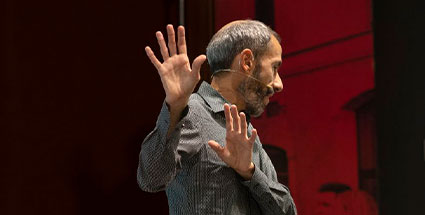
Walking the Scientific Path Through the Realm of Romantic Love
Titled "Love is in the Air: Exploring the Psychological Perspective," psychologist José Antonio Hinojosa, a member of the Multidisciplinary Research Institute of UCM, engaged in an insightful discussion with our students. The session delved into the Psychology of Love, unraveling its perceptions and intricacies.
See article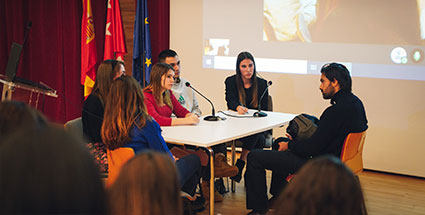
Clinical simulation with standardized patient
The simulated or standardized patient is the backbone of an educational methodology of great academic value and an essential tool for the acquisition of basic skills and competences for the psychology professional. In the Bachelor's Degree in Psychology at Nebrija University we consider the use of clinical simulation that brings students closer to real environments and allows clinical immersion in a controlled context to be essential.
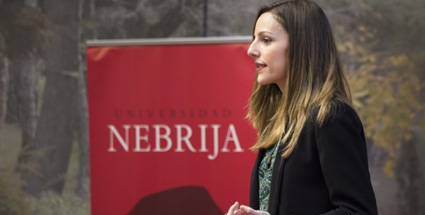
"The greatest advantage of technologies in clinical psychology is the recording of information"
Psychology students had the opportunity to participate in the specialized meeting in clinical psychology with psychologist Marta De la Torre.
See articleOpening ceremony of the academic year 2022-2023
Opening Ceremony of the academic year at the Madrid-Princesa Campus of Nebrija University.
IMPULSA I. Nebrija Employment Event
Event in which Nebrija talent connects with companies, organized by Nebrija Alumni and the Professional Careers department.
Investiture ceremony of Carlos López-Otín as doctor honoris causa
Nebrija University awarded biochemist Carlos López-Otín an honorary doctorate last Friday, November 18, in a ceremony that took place in the Graduate Hall of the Madrid-Princesa Campus.
Feast Day of Saint Thomas Aquinas 2023
On Friday, January 27, the feast day of Saint Thomas Aquinas was celebrated with an event that took place in the Graduate Hall of the Madrid-Princesa Campus. Rolf Tarrach, trustee of Nebrija University, was in charge of teaching the master class entitled Confidence in Knowledge.








